 10/12/2010 13:37 10/12/2010 13:37 |
|
| | | OFFLINE | | Post: 21.661
Post: 4.296 | Registrato il: 28/08/2005
Registrato il: 20/01/2009 | Administratore | Utente Master | |
|


 See preceding page for newly-added posts from 12/9/10.
See preceding page for newly-added posts from 12/9/10.

 Friday, Dec. 10, Second Week in Advent
Friday, Dec. 10, Second Week in Advent
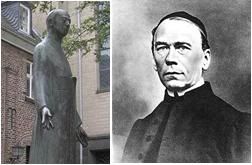 BLESSED ADOLPH KOLPING (Germany, 1813-1865)
BLESSED ADOLPH KOLPING (Germany, 1813-1865)
Priest,'Father of all apprentices'
Son of a peasant, he was a shoemaker before becoming a priest.
In Cologne, he set up the first workmen's society that promoted
the value of family life and the dignity of labor. His apostolate
with laborers was similar to John Bosco's with the urban young.
By the time he died, there were >400 Kolpingfamilien societies
in Germany. Today there are Kolpingwerk societies in 54 countries
of the world. He is buried in Cologne Cathedral and beatified in 1991.
OR for Dec. 9-10:


The Pope's prayer before the Immacolata at Piazza Spagna:
'For mankind together without bounds, under Christ'
At the Angelus, he says God's mercy is greater than any evil
Other Page 1 stories: EU leader calls Germany anti-European because Chancellor Merkel's government objects to a plan to float Eurobonds; and violence escalates in Haiti due to protests against the undecided results of recent presidential elections which may require a runoff. In the inside pages: Cardinal Bertone celebrates the Dec. 8 Mass in Macerata, on the fourth centenary year of Fr. Matteo Ricci's death; Cardinal Bagnasco's Dec. 8 homily in Genoa and his presentation of the theology volume of Joseph Ratzinger's Complete Works; the Preface written by Mons. Georg Ratzinger for Elisabeth Thurn und Taxis new book on folk religion (translated yesterday in the preceding page of this thread); and an article by Cardinal Ravasi on the 200th anniversary of the Pontifical Roman Academy of Archeology.
THE POPE'S DAY
The Holy Father began his public day at 9 a.m. by attending the second Advent sermon for the Roman Curia
by Fr. Raniero Cantalamessa, Preacher of the Pontifical Household.
Later he met with
- H.E. Mme. Dalia Grybauskaitė, President of the Republic of Lithuania, and her delegation
- Cardinal Angelo Amato, Prefect of the Congregation for the Causes of Sainthood
- Mons. Joan-Enric Vives Sicília, Archbishop of Urgell (Spain) and co-Prince of Andorra
- H.E. Antonio Zanardi Landi, ambassador of Italy to the Holy See, and his wife, on a farewell visit
- Ronald Lauder, President of the World Jewish Congress.
In the afternoon, he will meet with
- Cardinal William Joseph Levada, Prefect of the Congregation for the Doctrine of the Faith (weekly meeting)
Today, the Holy Father approved decrees proclaiming four miracles which will lead to one new saint
and three blesseds; and recognizing the martyrdom of three persons and the heroic virtues of four others,
thus opening the way for the process of their beatification.
[I believe the Polish hierarchy expected an announcement in this batch confirming John Paul II's beatification miracle.]
 - The National Catholic Reporter online has posted an imaginary dialog written by someone who calls herself a 'Roman Catholic woman priest' in which she mocks what Benedict XVI says in LOTW about why the Church does not and cannot ordain women priests. (I am sorry but the very thought of these ridiculous, preeningly arrogant, egomaniacal priestettes raises all my uncharitable hackles to battle position!)
- The National Catholic Reporter online has posted an imaginary dialog written by someone who calls herself a 'Roman Catholic woman priest' in which she mocks what Benedict XVI says in LOTW about why the Church does not and cannot ordain women priests. (I am sorry but the very thought of these ridiculous, preeningly arrogant, egomaniacal priestettes raises all my uncharitable hackles to battle position!)
[Modificato da TERESA BENEDETTA 10/12/2010 15:03] |
| |
|
| |
 10/12/2010 18:09 10/12/2010 18:09 |
|
| | | OFFLINE | | Post: 21.663
Post: 4.298 | Registrato il: 28/08/2005
Registrato il: 20/01/2009 | Administratore | Utente Master | |
|
 Pope authorizes decrees for
Pope authorizes decrees for
a future saint and four blesseds,
the martyrdom of 3 and
the heroic virtues of 4

VATICAN CITY, 10 DEC 2010 (VIS) - At a private audience today with Cardinal Angelo Amato S.D.B., Prefect of the Congregation for the Causes of Saints, the Pope authorised the congregation to promulgate the following decrees:
MIRACLES
- Blessed Guido Maria Conforti, Italian archbishop-bishop and founder of the Pious Society of St. Francis Xavier for Foreign Missions (1865-1931).
- Servant of God Francesco Paleari, Italian priest of the "Cottolengo" Institute (1863-1939).
- Servant of God Anna Maria Janer Anglarill, Spanish foundress of the Institute of Sisters of the Holy Family of Urgell (1800-1885).
- Servant of God Marie Clare of the Child Jesus (nee Libania do Carmo Galvao Meixa de Moura Telles e Albuquerque), Portuguese foundress of the Franciscan Hospitaller Sisters of the Immaculate Conception (1843-1899).
- Servant of God Dulce (nee Maria Rita Lopes Pontes), Brazilian religious of the Congregation of the Missionary Sisters of the Immaculate Conception of the Mother of God (1914-1992).
Conforti will be canonized, and the other four will be beatified.
MARTYRDOM
- Servant of God Alois Andritzki, German diocesan priest who died in the concentration camp of Dachau (1914-1943).
- Servants of God Jose Nadal y Guiu (1911-1936) and Jose Jordan y Blecua (1906-1936), Spanish diocesan priests, killed in hatred of the faith during religious persecution in Spain.
- Servants of God Antonio (ne Miguel Faundez Lopez), Spanish professed priest of the Order of Friars Minor (1907-1936) and Bonaventura (ne Baltasar Mariano Munoz Martinez) Spanish cleric of the Order of Friars Minor (1912-1936), as well as Pedro Sanchez Barba (1895-1936) and Fulgencio Martinez Garcia (1911-1936), Spanish priests and pastors of the Third Order of St. Francis of Assisi, killed in hatred of the faith during religious persecution in Spain.
HEROIC VIRTUES
- Servant of God Antonio Palladino, Italian diocesan priest and founder of the Congregation of Dominican Sisters of the Blessed Sacrament (1881-1926).
- Servant of God Bechara (ne Selim Abou-Mourad), Lebanese religious of the Basilian Salvatorian Order of the Melkites (1853-1930).
- Servant of God Maria Elisa Andreoli, Italian foundress of the Congregation of Reparatrix Sisters Servants of Mary (1861-1935).
- Servant of God Maria Pilar of the Sacred Heart (nee Maria Pilar Solsona Lamban), Spanish religious of the Institute of the Daughters of Mary, Religious of Pious Schools (1881-1966).
[Modificato da TERESA BENEDETTA 10/12/2010 18:09] |
| |
 10/12/2010 19:23 10/12/2010 19:23 |
|
| | | OFFLINE | | Post: 21.664
Post: 4.299 | Registrato il: 28/08/2005
Registrato il: 20/01/2009 | Administratore | Utente Master | |
|
 If only because of professional courtesy on his part and an inbred sense of what the Spanish call delicadeza, which best translates in this case as refined discretion, I really did not expect Vittorio Messori to review LOTW, since he had done a similar project with then Cardinal Ratzinger and another one with John Paul II. And indeed, he has not. But he did make two brief comments early on about the Pope's condom remarks...
If only because of professional courtesy on his part and an inbred sense of what the Spanish call delicadeza, which best translates in this case as refined discretion, I really did not expect Vittorio Messori to review LOTW, since he had done a similar project with then Cardinal Ratzinger and another one with John Paul II. And indeed, he has not. But he did make two brief comments early on about the Pope's condom remarks...
The first was a comment made to Apcom the day that OR came out with its ill-advised excerpts that included the partial remarks on condoms. This is what APCOM wrote:
'A charitable act'
Translated from
 ...For the writer Vittorio Messori, what the Pope said was 'a charitable act".
...For the writer Vittorio Messori, what the Pope said was 'a charitable act".
"Nothing in it affects the ethical guidelines of the Magisterium. Benedict XVI was referring to the use of a condom not for contraceptive purposes but for a charitable reason, in the case of a prostitute who would use a condom to avoid infecting a partner", Messori said.
He likened it to the practice in medieval times of 'suspending the marital act' in times of the plague.
The second was something he wrote two days later in APERITIVO, the column he has carried over to La Bussola Quotidiana:
Better to say less
Translated from

November 23, 2010
Once more a statement by the Pope, isolated from its context, has been exploited, and Benedict XVI is now being 'hung by his words', as it has happened many times before.
Without observing a minimum of prudence, none other than L'Osservatore Romano had to choose to include - out of all the many parts in Peter Seewald's interview-book - that in which the Pope speaks of condom use, and even worse, published only part of what he said and without appropriate context.
It was obvious that worldwide media attention would focus on it right away. And this nth communications error leads us to note once again that the Pope is, in fact, ill-served by those who should he aiding him in the Vatican.
In my opinion, there is another problem that is mounting. Perhaps it is time for the Church to cut down on words, on the documents, the interventions, verbosity in general, because of the increasing risk that these words will be exploited and misrepresented - and end up having the Pope, and the Church, in general, appear to say something different from what was really intended.
On a more general issue, I have much to dispute, for a change, with Mr. Mastroianni in the following piece.
How many blunders must the media make
before they understand this Pope?
by Bruno Mastroianni
Translated from

Dec. 9, 2010
They criticized him for what he said about condoms and AIDS, only to find out that most experts say he is right about it.
They mocked him for the ordinariates he conceived for disaffected Anglicans, saying these would be unsuitable for them - and now we have at least five bishops, dozens of priests, and their parishioners who plan to be in full communion with Rome by Easter.
They sought to show he was in the midst of the cover-up for offending priests, and now documents from 1988 show that he had tried even then to make canon law more adaptable for dealing with such cases (and even the New York Times has acknowledged this).
They have always called him conservative. They have sought to set him against the Jews, against Muslims, against secular intellectuals [ironically, the new rector of La Sapienza University* has invited him to the university after the January 2008 cancellation of the Pope's visit).
It seems that the 'Ratzinger case' is emblematic of the state of the secular West in its confrontation with Christianity: continually dousing it with cold water. ['Cold water' is hardly the metaphor for it. I'd say poisoned pitchforks, voodoo spells and lightning bolts!]
Even Wikileaks has revealed the confusion and surprise of so-called diplomatic analysts of the US State department, relying on badly digested reports in the Italian media, that Joseph Ratzinger came to be elected Pope.
The point is always the same: in seeking to pigeonhole the Catholic faith in the smug socio-political-economic categories of the dominant culture, the seculars keep making blunders one after the other [with respect to this Pope]. [Of course, they do not consider them blunders at all, and will continue to perpetrate their lies and half-truths because they have invested so much already].
Perhaps it is time for them to change their outlook. [But they won't, because to do that would be to ask them to change their ideology.]
They do not need to operate any Copernican revolution in their thought. {But that's what changing ideology amounts to!] They simply need to learn the lessons that are abundant from the heap of blunders they have made so far.
[Mastroianni has to be heavily ironic here, because there is not a snowball's chance in hell that MSM and dominant secular thought will change, as long as the Church and her Pope continue to prevail! What I find most galling is that these opponents appear to treat Benedict XVI as simply another stubborn old curmudgeon without a brain, instead of the superior intellectual and eminently reasonable man that he is. Has the media ever treated the Dalai Lama or Billy Graham as scornfully and disrespectfully as they habitually treat our Pope? Even a scoundrel like the 'Reverend' Al Sharpton gets more respect. But then, of course, he is black, and he is not German, much less Catholic!]
[*For readers who may be unaware of the La Sapienza reference, university management had invited the Pope in January 2008 to give the keynote address for the winter academic year at Italy's largest university (40,000 students, 2000 professors) - it was founded by a Pope in the 14th century but became a state university with the unification of Italy in the 1860s). Then, because of a media-inflated protest by 67 professors in the physics department, based on an erroneous Wikipedia entry attributing an anti-Galileo statement to Cardinal Ratzinger, management capitulated and scaled down the Pope's participation to being just one of a number of speakers. Bad enough under the circumstances.
When a small core of leftist students decided to call on labor unions all over Italy to join a protest demonstration during the event, the Pope decided against going in order to avoid any possible incidents that would involve the demonstrators and bystanders. Instead, he sent a copy of the address he meant to deliver - one, by the way, that should have been included with the Regensburg, Bernardins and Westminster Hall addresses that will be the subject of seminars in the Diocese of Rome next month.]
[Modificato da TERESA BENEDETTA 11/12/2010 22:12] |
| |
 10/12/2010 19:53 10/12/2010 19:53 |
|
| | | OFFLINE | | Post: 21.665
Post: 4.300 | Registrato il: 28/08/2005
Registrato il: 20/01/2009 | Administratore | Utente Master | |
|
|
| |
 10/12/2010 22:11 10/12/2010 22:11 |
|
| | | OFFLINE | | Post: 21.666
Post: 4.301 | Registrato il: 28/08/2005
Registrato il: 20/01/2009 | Administratore | Utente Master | |
|

 Benedict XVI says the Church recognizes
Benedict XVI says the Church recognizes
Jews' historical connection to Israel

ROME, Dec. 10 (JTA) -- World Jewish Congress officials met with Pope Benedict XVI and separately with senior Italian officials on Friday.
The delegation, led by WJC president Ronald Lauder, asked the Pontiff to denounce the delegtimization of Israel.
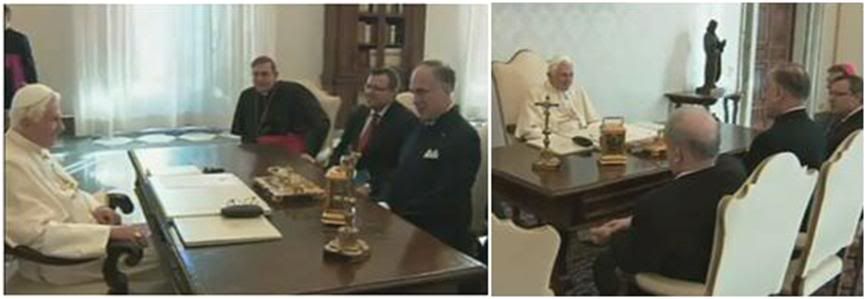
"We discussed critical issues affecting world Jewry," said Lauder, “and we expressed to the Pope how much we value the close relationship we have enjoyed with the Vatican over many years in our quest for a secure Israel and a safer future for Jews everywhere.”
Benedict stated that the Church recognizes the deep and historical connection of the Jewish people to their ancient homeland, the Holy Land, going back to the time of Abraham, and expressed his commitment to help foster understanding of the bond between the nation of Israel and the land of Israel among people throughout the world.
In a related development, the Vatican released a statement Friday describing a "good and open atmosphere" in Thursday's latest round of talks aimed at finalizing bilateral economic relations between Israel and the Holy See.
The talks, held in Jerusalem, started with mention of the telegram the Pope sent to Prime Minister Benjamin Netanyahu expressing his "prayers and solidarity" with victims of the recent forest fire and his appreciation of the "selfless dedication" of those involved in the rescue operation.
Later, Lauder told Italian Foreign Minister Franco Frattini in their meeting that the Jewish world "deeply appreciates" its "important and well-established friendship with the Italian government" and also appreciates "Italian attention to the safety of the people of Israel."
The World Jewish Congress was organized in Genea in 1939 to represent Jewish communities around the world in addressing the interests and needs of Jews and Jewish communities throughout the world.
It has been working mainly on the issues of the defense of Israel, anti-Semitism and the Holocaust, terrorism and the threat of Iran, and interfaith dialog.
Jewish leaders ask Pope Benedict
to combat delegitimization of Israel
By Shlomo Shamir

ROME, Dec. 10 - A delegation of leaders of the World Jewish Congress met with Pope Benedict XVI in the Vatican on Friday and asked the Pontiff to speak out against the "delegitimization" of Israel.
"We discussed critical issues affecting world Jewry," said WJC President Ronald S. Lauder said in a statement. “[We] expressed to the Pope how much we value the close relationship we have enjoyed with the Vatican over many years in our quest for a secure Israel and a safer future for Jews everywhere.”
Lauder requested that the Pope speak out against the "delegitimization" of Israel, particularly the denial of Jewish links to holy sites such as the Temple Mount and the Western Wall, as well as Rachel's Tomb in Bethlehem - a site that is holy to both Jews and Christians.
According to the WJC statement, the Pope emphasized the need to continue to combat anti-Semitism in the Christian world, which he characterized as unacceptable.
The Pope talked about the importance of Jews and Catholics working together to fight anti-Semitism in all its forms, noting Judaism's patrimony to Christianity.
WJC Secretary General Designate Dan Diker asked that the Catholic Church take a leading role in the fight against the "delegitimization" of Israel, which he called a new "politically correct" form of anti-Semitism.
Pope Benedict is said to have responded, saying that the Catholic Church recognizes the deep and historical connection of the Jewish people to the land of Israel and expressed his commitment to help bolster better understanding of that connection among people throughout the world.
 THE VATICAN AND ISRAEL
THE VATICAN AND ISRAEL


COMMUNIQUE ON DEC. 9 BILATERAL TALKS
Permanent working Commission
between the Holy See and Israel
The meeting of the Plenary Commission took place in a good and open atmosphere. The Delegation of the Holy See was headed by Monsignor Ettore BALESTRERO, Under-Secretary for Relations with States and the Delegation of the State of Israel was headed by Mr. Danny AYALON, MK, Deputy Minister of Foreign Affairs.
At the start of the meeting, reference was made to the telegram sent by His Eminence Tarcisio Cardinal Bertone, the Secretary of State of His Holiness, to H.E. Benyamin Netanyahu, the Prime Minister of the State of Israel, conveying Pope Benedict XVI's assurances of his prayers and his solidarity with the families of those who lost their lives, to the wounded and to all who were affected by the recent forest fire in northern Israel, as well as "his appreciation for the rescue efforts which were carried out with such selfless dedication," and his prayers "that those who have lost their homes in this tragedy may soon be able to rebuild their lives."
The Plenary discussed the next steps towards conclusion of the Agreement.
The Plenary will hold its next meeting on 16 June 2011 at the Vatican. The next "Working Level" meeting will take place on 3 February 2011.
The Delegation of the Holy See (H.S.):
1. Monsignor Ettore BALESTRERO, Under-Secretary for Relations with States, Chairman
2. HE Archbishop Antonio FRANCO, Apostolic Nuncio in Israel, Chairman of the Delegation at the working level"
3. Mgr. Maurizio MALVESTITI, Under-Secretary of the Congregation for the Eastern Churches
4. Mgr. Alberto ORTEGA MARTIN, Secretariat of State
5. HE Bishop Giacinto-Boulos MARCUZZO, Latin Patriarchal Vicar
6. Mgr. Waldemar Stanislaw SOMMERTAG, Counsellor of the Apostolic Nunciature
7. Father David-Maria A. JAEGER, OFM, Legal Adviser
8. Mr. Henry AMOROSO, Second Legal Adviser
9. Archimandrite Maher ABBOUD
10. Father Pietro FELET, SCJ
11. Father Ibrahim FALTAS, OFM
12. Father Giovanni CAPUTA, SDB, Secretary
The Delegation of the State of Israel (S.I.):
1. Mr. Danny AYALON, Deputy Minister of Foreign Affairs, Chairman
2. Mr. Shmuel BEN-SHMUEL, Head of World Jewish and Interreligious Affairs Bureau, Ministry of Foreign Affairs (MFA)
3. Mr. Mordechay LEWY, Ambassador of Israel to the Holy See
4. Ms. Michal GUR-ARYEH, Dep. Director, Dept. of General Law, MFA
5. Mr. Bahij MANSOUR, Director, Department of Religious Affairs, MFA
6. Itai APTER, Adv, Ministry of Justice
7. Mr. Oded BROOK, Head of the International Affairs Division, Ministry of Finance
8. Mr. David SEGAL, Diplomatic Adviser, Deputy Foreign Minister's Bureau
9. Mr. Ashley PERRY, International Media Adviser to the Deputy Foreign Minister
10. Ms. Klarina SHPITZ, Chief of Staff, Deputy Foreign Minister's Bureau
11. Chen Ivri APTER, Deputy Foreign Minister's Bureau
[Modificato da TERESA BENEDETTA 10/12/2010 22:19] |
| |
 10/12/2010 23:42 10/12/2010 23:42 |
|
| | | OFFLINE | | Post: 21.667
Post: 4.302 | Registrato il: 28/08/2005
Registrato il: 20/01/2009 | Administratore | Utente Master | |
|
 Another very belated post of a review of LOTW by someone who got an advance copy of it...I'm obviously not very efficient at flushing out these reviews in English, let alone in other languages, so I catch as catch can...S+L stands for Salt and Light, the Canadian Catholic TV network. The writer was part of the S+L team that covered the Pope's visit to Santiago and Barcelona last month...This review was also published in the National Post newspaper.
Fearless and engaged:
Another very belated post of a review of LOTW by someone who got an advance copy of it...I'm obviously not very efficient at flushing out these reviews in English, let alone in other languages, so I catch as catch can...S+L stands for Salt and Light, the Canadian Catholic TV network. The writer was part of the S+L team that covered the Pope's visit to Santiago and Barcelona last month...This review was also published in the National Post newspaper.
Fearless and engaged:
In LOTW, the Pope speaks
to the reader one on one
by Kris Dmytrenko

November 23rd, 2010
A few pages into Light of the World: The Pope, the Church, and the Signs of the Times, Peter Seewald disappeared...
The German journalist had secured one of the world’s most elusive interviews—a one-on-one with the Pope. Since the start of his pontificate, Benedict XVI had until now given only a couple of interviews, apart from brief sessions where the questions were carefully pre-selected.
And those other interviews — most notably, with Polish state television in 2005 and with German media the following year — were not nearly as generous as the six one-hour audiences that this author was granted.
Seewald doesn’t squander the opportunity. He poses almost all of the questions that a Catholic journalist might want to know. As I read the book last week — transfixed, in two sittings — Seewald receded from the interview.
It became a conversation between the Pope and me. As Archbishop Rino Fisichella described the book at its launch in the Vatican, the Holy Father “opens the door of his apartment and lets us in”. [More than to his apartment, to his heart!]
As the interview shifted from one controversial topic to another, I wondered how the press would handle the material. The media has become accustomed to mining the Pope’s statements for oblique references. And here, he speaks directly to countless issues of immense importance to Catholics and the world. It is the mother lode.
I didn’t foresee that the Pope’s remarks on condoms would consume all of the media’s attention. The fact that it did represents a terrible irony. The topic was initiated as Seewald recalled the pontiff’s previous statement about condoms en route to his papal visit to Cameroon and Angola.
“The media coverage completely ignored the rest of the trip to Africa,” the Pope complained, “on account of a single statement.”
Once again, a remark about condoms (that, the Holy See stresses, does not signal any change in Church teaching) threatens to bury other arguably more significant pronouncements.
These pertain to the liturgy, secularism, the wartime legacy of Pope Pius XII, the Church’s relationship with Islam, and even clergy sex abuse. Months ago, it was inconceivable that the media would divert attention away from the abuse crisis.
The Pope offers important new statements in each of those areas. Still, his general positions are largely known to those who pay attention, even if they remain misunderstood by the general public. More revelatory are the candid descriptions of his personal life as a pope.
“Are you afraid of an assassination attempt?,” Seewald asks. No, the Pope answers plainly. The heightened security measures during his trip to the Holy Land were, in his estimation, “almost excessive”.
Does he ever feel so confined in the Vatican that he must escape incognito, as John Paul II famously did?
“I don’t do that,” he tells Seewald, though he acknowledges that the papacy deprives him of some of the freedoms of his past life.
He confesses that, at 83 years old, his “forces are diminishing” and he needs sufficient rest to carry out his responsibilities. He doesn’t feel the need to use an exercise bike that was installed in the apostolic palace.
Pilgrims preparing for next year’s World Youth Day in Madrid, Spain, are reassured that the Pope also plans to attend, but only “if, God willing, I am still alive.”
One sometimes hears Catholics wonder aloud about whether World Youth Days are enjoyable experiences for this Pope, whose reputation as a reserved academic contrasts with John Paul II’s more expressive public persona. He maintains that the global gatherings “have actually turned out to be a genuine gift for me.”
Brazenly, Seewald does not hesitate to engage the Holy Father in a direct comparison with his predecessor.
“I really am a debtor,” says Benedict, a Pope who is at peace with his limitations, “a modest figure who is trying to continue what John Paul II accomplished as a giant.”
During the 2005 conclave that elected him, he admits that he was convinced that there were “better and younger candidates.”
Nevertheless, it was Joseph Ratzinger who would enter the “room of tears” next to the Sistine Chapel. There, he comforted himself with the knowledge that “there must be, besides the great Popes, little ones also, who give what they can.”
While Benedict emerges as a man of humility in Light of the World, he equally manages to dispel some of his perceived weaknesses. Repeatedly during his pontificate, Vatican commentators have charged that the Pope is too isolated —t hat, while he is engrossed in his prolific writing, an overly protective circle of advisers shields him from public criticism.
To this the Pope responds, “I cannot say that I live in an artificial world of courtly personages.”
He tells Seewald that he watches the news daily. But his perspective clearly is not drawn from the echo chamber of the media. Rather, he says his worldview is shaped by his daily contact with bishops, priests, religious and lay people from all around the world.
“There are, I believe, few people who have as many meetings as I do,” he tells Seewald — the lone boast in this candid portrait of a Pope, who invites us to meet him, one-on-one.
[Modificato da TERESA BENEDETTA 10/12/2010 23:45] |
| |
 11/12/2010 14:39 11/12/2010 14:39 |
|
| | | OFFLINE | | Post: 21.668
Post: 4.303 | Registrato il: 28/08/2005
Registrato il: 20/01/2009 | Administratore | Utente Master | |
|

 Saturday, December 11, Second Week of Advent
Saturday, December 11, Second Week of Advent
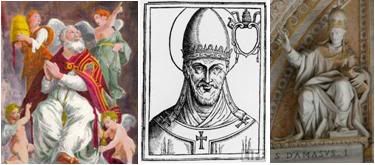 ST. DAMASUS (POPE DAMASUS I, 366-384) (b Lusitania [Portugal] ca 305, d Rome 384)
ST. DAMASUS (POPE DAMASUS I, 366-384) (b Lusitania [Portugal] ca 305, d Rome 384)
The son of a Roman priest, Damasus was described by his secretary St. Jerome as
“an incomparable person, learned in the Scriptures, a virgin doctor of the virgin
Church, who loved chastity and heard its praises with pleasure.” He served Pope
Liberius and was elected to succeed him in 366. But opponents elected an anti-Pope
Ursinus, and violent battles between the two camps followed, that ended only after
Valentinian became emperor and exiled Ursinus. Damasus commissioned Jerome to
translate the entire Bible into what became the first standard version of all 72 books,
the Vulgate. Damasus is also remembered for uncovering the Roman catacombs to pay
proper homage to the early Christian martyrs. He defended Christian orthodoxy
against Arianism and other heresies and was upheld by the Council of Constantinople
in 382. He strengthened the faith after it became the official religion of empire
with his liturgical and esthetic enhancement of the churches of Rome, and defended
the rights of the Papacy in the imperial setting.
Readings for today's Mass:
www.usccb.org/nab/readings/121110.shtml
OR today.
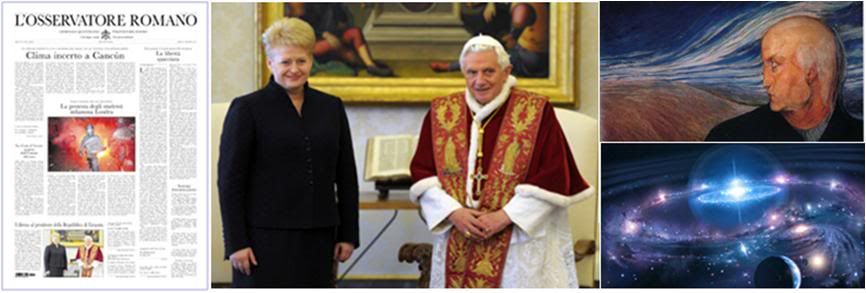 The only papal story in this issue is the Pope's meeting yesterday with the President of the Ukraine. Other Page 1 stories: Uncertainty in Cancun over whether the international conferenc on climate change will be able to agree on any meaningful measures, just as it failed to do last year in Copenhagen; a commentary on the trend in the US to legalize the use of medical marijuana points out that the single substances responsible for any perceived medical effects such as pain reduction do not justify the harmful effects of all the other active ingredients in cannabis; student protests continue in London against planned university tuition hikes; and the African Union suspends the Ivory Coast from all AU activities because the defeated president will not accept the election results . In the inside pages, a major article on the Vatican initiative called STOQ (science, theology and the ontological quest) with lectures on man and his place in the cosmos, in the light of continuing astrophysical discoveries; a lecture by Cardinal Sandri on the cooperation of the Christian churches of Europe in the new evangelization, given at a seminar on the cooperation between the Holy See and the Ukraine to preserve a Christian Europe; and the preface by Cardinal Dsiwisz to a new book that puts together John Paul II's homilies on Christmas from when he was Archbishop of Cracow through his years as Pope.
The only papal story in this issue is the Pope's meeting yesterday with the President of the Ukraine. Other Page 1 stories: Uncertainty in Cancun over whether the international conferenc on climate change will be able to agree on any meaningful measures, just as it failed to do last year in Copenhagen; a commentary on the trend in the US to legalize the use of medical marijuana points out that the single substances responsible for any perceived medical effects such as pain reduction do not justify the harmful effects of all the other active ingredients in cannabis; student protests continue in London against planned university tuition hikes; and the African Union suspends the Ivory Coast from all AU activities because the defeated president will not accept the election results . In the inside pages, a major article on the Vatican initiative called STOQ (science, theology and the ontological quest) with lectures on man and his place in the cosmos, in the light of continuing astrophysical discoveries; a lecture by Cardinal Sandri on the cooperation of the Christian churches of Europe in the new evangelization, given at a seminar on the cooperation between the Holy See and the Ukraine to preserve a Christian Europe; and the preface by Cardinal Dsiwisz to a new book that puts together John Paul II's homilies on Christmas from when he was Archbishop of Cracow through his years as Pope.
No events announced for the Holy Father today.
VATICAN STATEMENT
ON WIKILEAKS DISCLOSURES

The Vatican Press office released this statement today:
Without venturing to evaluate the extreme seriousness of publishing such a large amount of secret and confidential material, and its possible consequences, the Holy See Press Office observes that part of the documents published recently by Wikileaks concerns reports sent to the U.S. State Department by the U.S. Embassy to the Holy See.
Naturally these reports reflect the perceptions and opinions of the people who wrote them and cannot be considered as expressions of the Holy See itself, nor as exact quotations of the words of its officials. Their reliability must, then, be evaluated carefully and with great prudence, bearing this circumstance in mind.
NB: The MSM today is full of the leaked documents which, on the whole, do not substantially reveal anything that was not already reported in the news at the time individual events were happening or developing. The only new element is the subjective comments attached by US embassy officials in Rome to their reports.
 - From a quick review of what's online so far about the Wikileaked documents, the only new information seems to be a warning to the Vatican by the UK ambassador to the Holy See last year that the Pope's decision to facilitate the entry of disaffected Anglicans to the Catholic Church would trigger violence in the UK. None of that happened, of course, but was Ambassador Campbell perhaps simply reacting literally to a now-infamous London Times headline regarding 'Vatican tanks parked in Westminster'? The US State Department cables disclosed so far appear to show that many diplomats are no better equipped to evaluate current affairs than the average informed man on the street.
- From a quick review of what's online so far about the Wikileaked documents, the only new information seems to be a warning to the Vatican by the UK ambassador to the Holy See last year that the Pope's decision to facilitate the entry of disaffected Anglicans to the Catholic Church would trigger violence in the UK. None of that happened, of course, but was Ambassador Campbell perhaps simply reacting literally to a now-infamous London Times headline regarding 'Vatican tanks parked in Westminster'? The US State Department cables disclosed so far appear to show that many diplomats are no better equipped to evaluate current affairs than the average informed man on the street.
- The most potentially 'damaging' of the leaked cables - the one regarding the Vatican's 'refusal to cooperate' with the Murphy Commission in Ireland, already reported and commented on at the time - is already being re-spun and re-headlined in the world media, but a review of the lengthy report-cum-assessment of the affair by the present US ambassador to the Vatican actually puts the Vatican in a good light. The UK's The Guardian has reproduced Diaz's report:
www.guardian.co.uk/world/us-embassy-cables-documents/251110
- It doesn't pay to reproduce the news items on these leaks, but the ones on which the MSM have focused so far, besides the two above are:
o The Pope helped to free British sailors held by Iran in 2008 (known), but the UK government was reluctant to acknowledge the Pope's role publicly (not previously known)
o The Vatican wanted Turkey kept out of the European Union (a misleading headline, since the cables actually trace the Vatican's position - as opposed to Cardinal Ratzinger's personal opinion - from 'no objection provided Turkey fulfills all the conditions about respect for human rights, including religous freedom' to 'the best arrangement would be a separate EU agreement with Turkey outside of membership'.
o The Vatican is so averse to modern communications technology that Fr. Lombardi is the only Vatican official to have a Blackberry and most Vatican officials do not even have an e-mail address. [Very likely a malicious exaggeration. As for e-mail, most of the Vatican organisms on the Vatican site post their e-mail addresses, and even the Curial officials older than 60 (i.e., 'old dogs' who can't be expected to learn 'new tricks') surely have qualified subordinates handling their IT needs.]
- In his Friday column, John Allen on NCReporter posts his recent interviews with the OR editor and with Mons. Tobin, the new #2 man at the Congregation for Institutes of Consecrated Life etc, which oversees religious orders throughout the world.
ncronline.org/blogs/all-things-catholic/thoughts-rome-vatican-newspaper-religi...
IMHO, the interview with Vian does not confront the major journalistic problems with the OR and generally serves to provide Vian a self-serving platform. Tobin, on the other hand, makes nice with the sisters' orders under apostolic visitation in the United States.
[Modificato da TERESA BENEDETTA 11/12/2010 18:01] |
| |
 11/12/2010 16:12 11/12/2010 16:12 |
|
| | | OFFLINE | | Post: 21.669
Post: 4.303 | Registrato il: 28/08/2005
Registrato il: 20/01/2009 | Administratore | Utente Master | |
|
 On Oct. 21, 2008, an article by Ruth Gledhill in the Sunday Tiems of London was headlined and led off with the line 'Desperate bishops invited Rome to park its tanks on Archbishop’s [of Canterbury] lawn'. It was an indication of how the British establishment was shaken by the announcement earlier that Benedict XVI had decided to grant a request by traditionalist Anglican bishops to facilitate their entry into the Catholic Church - an unprecedented and obviously historical event. Damian Thompson comments on how the UK ambassador to the Holy See reacted at the time...
Britain's Catholic ambassador to the Vatican
On Oct. 21, 2008, an article by Ruth Gledhill in the Sunday Tiems of London was headlined and led off with the line 'Desperate bishops invited Rome to park its tanks on Archbishop’s [of Canterbury] lawn'. It was an indication of how the British establishment was shaken by the announcement earlier that Benedict XVI had decided to grant a request by traditionalist Anglican bishops to facilitate their entry into the Catholic Church - an unprecedented and obviously historical event. Damian Thompson comments on how the UK ambassador to the Holy See reacted at the time...
Britain's Catholic ambassador to the Vatican
talked alarmist nonsense about
the Pope's offer to Anglicans

December 11th, 2010
From the US embassy cables revealed by WikiLeaks, dispiriting evidence that Francis Campbell, Britain’s Irish Catholic ambassador to the Vatican, sided with the ecumenical wafflers in his own Church – I’m thinking chiefly of his friend Cardinal Cormac Murphy-O’Connor – against a Pope who was trying to create unity between Anglo-Catholics and Rome through the Ordinariate.
Campbell wouldn’t agree with that analysis, but his melodramatic warnings of “violence against Catholics” and his prophecies of a disastrous papal visit are appallingly wide of the mark. My observations on the contents of the leaked cable are in square brackets and in bold:
In a subsequent conversation with DCM after Williams’ departure, Campbell (strictly protect) said Anglican-Vatican relations were facing their worst crisis in 150 years [inaccurate – there was a worse crisis in the 1890s] a result of the Pope’s decision.
The Vatican decision seems to have been aimed primarily at Anglicans in the U.S. and Australia [dubious], with little thought given to how it would affect the center of Anglicanism, England, or the Archbishop of Canterbury. [Not true. It's just that the Pope, the English Anglo-Catholic bishops and the CDF chose not to confide details to opponents of the scheme, such as Cardinal Murphy-O'Connor, the ecumenists, and Dr Williams – lest they torpedo it].
Benedict XVI, Campbell said, had put Williams in an impossible situation. If Williams reacted more forcefully, he would destroy decades of work on ecumenical dialogue [oh, please: the dialogue achieved little and had run into the ground 20 years earlier]; by not reacting more harshly, he has lost support among angry Anglicans.
The crisis is also worrisome for England’s small, mostly Irish-origin, Catholic minority, Campbell said. There is still latent anti-Catholicism in some parts of England and it may not take much to set it off. The outcome could be discrimination or in isolated cases, even violence [uh? this isn't your native Northern Ireland, Mr Ambassador], against this minority.
As for the Pope’s visit next year to England, Campbell said he now expected a chilly reception [he expected wrong, so far as the British people were concerned], especially from the Royal family – which was not a great supporter of ecumenical dialogue even before the crisis. [Interesting, but the reception from the Queen was not "chilly". Admittedly, Charles was rude in declining to meet the Pope – his loss.]
And there’s this passage, which implies that Campbell bought hook, line and sinker the Murphy-O’Connor/Kasper line that it was the Pope who shifted the ecumenical goalposts, not the Anglicans by deciding to ordain women bishops:
Campbell (protect) believes the Vatican’s move shifted the goal of the Catholic-Anglican ecumenical dialogue from true unity [100 per cent unachievable thanks to the Anglicans] to mere cooperation.
He further noted that some Vatican officials themselves believe that Williams should have been consulted – instead of simply told – about the apostolic constitution. [But the officials were really cross because THEY weren't consulted.] (Comment: Campbell was probably referring to Cardinal Kasper, who runs the Council for Christian Unity.) [And a certain ambitious English monsignor?]
It’s not hard to guess who had been briefing Campbell: the fantasy-merchants of ARCIC (former chairman, CMOC) and the Vatican ecumenical lobby, gloriously sidelined by the Pope at the request of Anglo-Catholic bishops who wanted full communion with the Holy See and saw this mafia of the mediocre standing in their way.
Francis Campbell; Cormac Murphy-O’Connor; Tony Blair. All good mates and all soft-Left defenders of the ecumenical status quo, keen to keep +Rowan happy.
But, come January, the English Ordinariate will be founded, and a great blessing it will prove, too. Some cradle Catholics will welcome it; others will be suspicious. Either way, I’d be surprised if they’re set upon by Protestant mobs.[Modificato da TERESA BENEDETTA 11/12/2010 16:13] |
| |
 11/12/2010 19:31 11/12/2010 19:31 |
|
| | | OFFLINE | | Post: 21.670
Post: 4.305 | Registrato il: 28/08/2005
Registrato il: 20/01/2009 | Administratore | Utente Master | |
|

 Pope makes pastoral visit tomorrow to
Pope makes pastoral visit tomorrow to
a suburb at the extreme eastern edge of Rome
Translated from the Italian service of

Dec. 11, 2010
 In lower right photo above, the park within which the church is located is traced in green.
In lower right photo above, the park within which the church is located is traced in green.
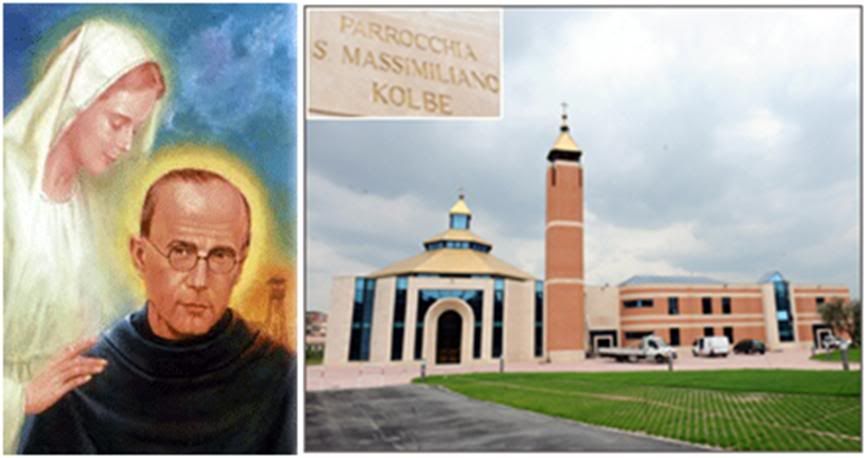
The community of Prato Fiorito in Rome's eastern periphery awaits the Holy Father's visit tomorrow with joy and trepidation. The Pope will say Mass at the parish church of St. Maximilian Kolbe which was dedicated in April last year by Cardinal Agostino Vallini, his Vicar in Rome.
Alessandro Gisotti spoke to the parish priest, don Slawomir Skwierzynski, who is Polish:
FR. SLAWOMIR: When I announced the Pope's visit last month to my parishioners, the first reaction was silence - everyone had their mouths agape in surprise. After a few moments, my assistant parish priest said to them: "Do you understand that we mean Pope Benedict XVI is coming here on Dec. 12?" Then they burst into long applause. It is an enormous joy for us despite that initial incredulity.
It is good that the Pope is visiting a really peripheral suburb, but one that has many difficulties, is that right?
Yes, This is a community that has become a dormitory suburb. People who go to work have to leave early in the morning and only get back late at night. [In one of the background articles I read, he says that the only means of public transport is a single bus line.] We do have many problems, and the news that the Pope is visiting us was quite a surprise...
How are the faithful preparing for the visit?
We immediately began the spiritual preparation through prayer and Eucharistic Adoration, through catecheses explaining the function of the Pope, what be represents for Catholics and for Christians...
You are a young Polish priest. What does it mean to be leading a parish dedicated to your compatriot St. Maximilian Kolbe, and to now receive a visit from the Pope?D.
It is an enormous emotional experience... In fact, I have only been parish priest since September 1, and it's my first parish. It's been a different experience for me, with very different responsibilities from what I have previously had.
But I see the Pope's visit as a sign of God's love for the parish, and the presence of Mary. Let me explain that. Since I began my duties here, in every Mass we have prayed an act of consecration to the Immaculate Heart of Mary, to whom St. Maximilian was devoted - he created the Militia of the Immaculate.. So I thought of placing my parish under her protection. For me, after three months, to have the Vicar of Christ visit us, in this parish, on Dec, 12, which is the feast of Our Lady of Guadalupe, is a very great sign.
The following background information is summarized from three articles I found online:
In the mid 1970s, Prato Fiorito (which means, Flowered Field), then called Ponte di Nona, was marshland with a few homes and no paved streets, a district located between farms and industrial establishments.
By 1983, it had grown enough so that the residents decided they needed a church. A parish was established in 1984, and the residents put up a 250-sq.m. prefabricated structure which served as their church until the new church was dedicated last year.
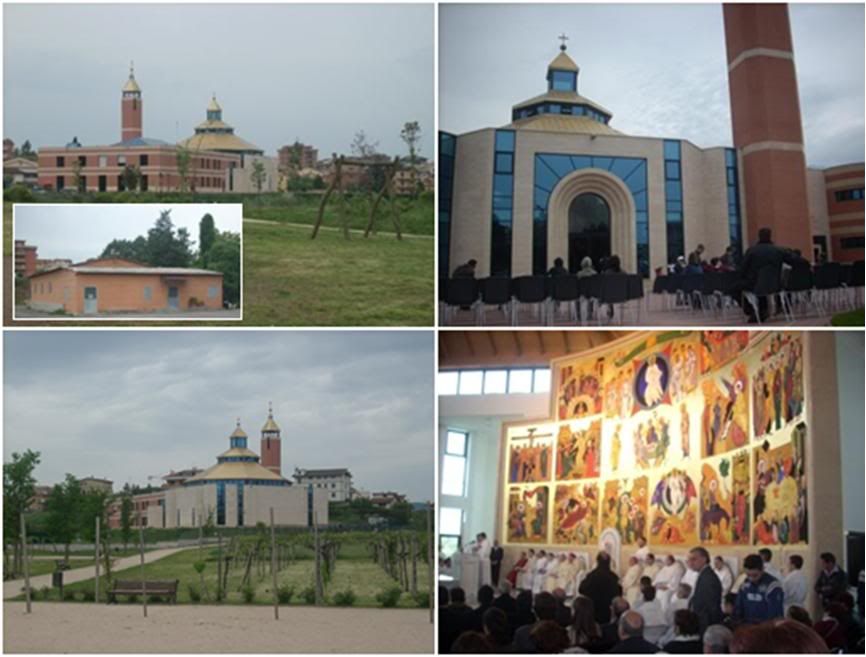 Inset on the left shows the structure that served as a church for 24 years; lower right photo, at the church dedication in April 2009 with Cardinal Vallini. The murals in the octagonal main chapel are scenes from the life of Christ painted by Kiko Arguelles, head of the Neo-Catechumenal movement, which is active in Prato Fiorito.
Inset on the left shows the structure that served as a church for 24 years; lower right photo, at the church dedication in April 2009 with Cardinal Vallini. The murals in the octagonal main chapel are scenes from the life of Christ painted by Kiko Arguelles, head of the Neo-Catechumenal movement, which is active in Prato Fiorito.
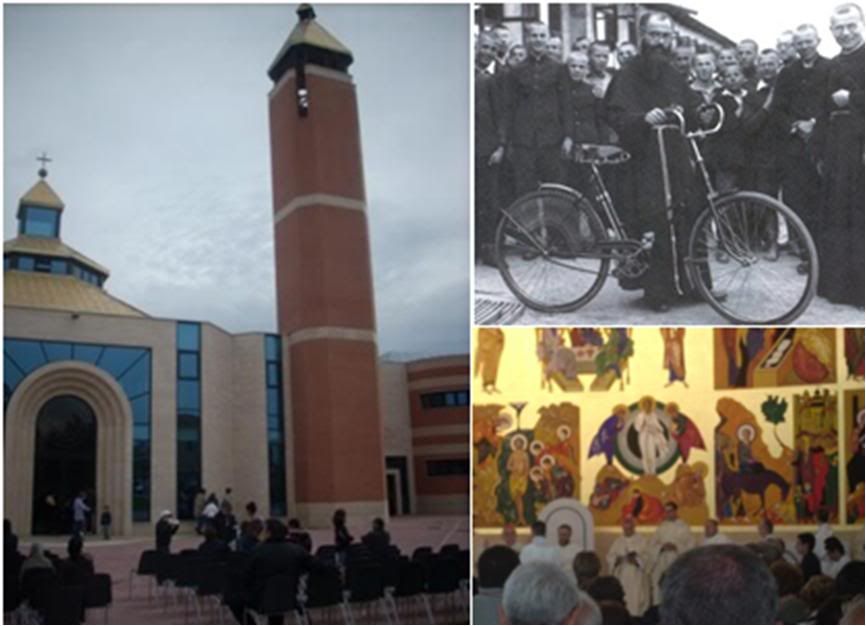
Construction on the church started in 2007 under a diocesan program to build new churches, and the project had the support of citizens' associations, business firms, ecclesiastical movements, and some politicians.
The church was built on a beautiful park that the community developed on eight hectares of wasteland that had been the site of an old city waterworks project.
Besides the church proper, the edifice houses all the parish offices, meeting halls and catechesis classrooms grouped around an interior courtyard. A separate structure is planned to house a community center for after-work leisure and youth activities.
Lately, new residents in the district have been mostly Chinese and Romanian immigrants.
 Benedict XVI's 10th
Benedict XVI's 10th
visit to a Roman parish
by Gianluca Biccini
Translated from the 12/12/10 issue of

Not an 'anonymous agglomerate, but a constellation where God knows each one personally by name, one by one". This was the evocative definition of a city by Benedict XVI when he paid homage to the Immaculate Conception at Piazza di Spagna on Wednesday.
It's a description of how the bishop of Rome sees 'his' city. That is why, since the start of his Pontificate, he has chosen to meet them in their communities during Advent and Lent.
He has done it nine times so far: in 2005, to Santa Maria Consolatrice in Casal Bertone; in 2006, to Dio Padre Miseriordioso in Tre Teste, and to Santa Maria Stella dell'Evangelizzazione in Torrino; in 2007, to Santa Felicita e Figli Martiri in Fidene, and to Santa Maria del Rosario in Martiri Portuensi; in 2008, to Santa Maria Liberatrice in Testaccio, and to San Lorenzo fuori le Mura; in 2009, to Santo Volto di Gesu in Magliana; and earlier in 2010, to San Giovanni della Croce in Colle Salario.
Most of them are peripheral communities. As the one he will visit tomorrow, in Prato Fiorito, off Via Prenestina and 4 kms outside Rome's circumferential highway.
He is visiting the parish named for St. Maximilian Kolbe, the Polich Franciscan martyred at Auschwitz. It is a parish with 8,000 souls, mostly small artisans, and many coming from other regions of Italy - especially from Calabria and Sicily in the South, and from the Abrozzo and the Marche in the east. When they first came here, most of them built their houses with their own hands.
"That is why they have a strong sense of belonging to this district," says the parish priest, Fr. Slawomir Skwierzynski, who is Polish like their patron saint, and was assigned the parish just three months ago.
"I come from Poznan," he says, "where I was ordained in 1998, but since July 2006, I have been incardinated into the Diocese of Rome."
When the parish was first established in 1984, it was initially assigned to the Compagnia di Maria, the congregation founded by St. Louis Montfort. They established a student dormitory and a provisional church there. The area of the dormitory came to be called Colle Monfortani (Montfort Hill).
The zone, which started to grow in the 1970s, belongs to Rome's 7th municipal department administratively. Pastorally, the parish is part of the 19th prefecture of the diocese's east sector.
On April 26, 2009, the Cardinal Vicar of Rome, Agostino Vallini, dedicated the new church which replaced the prefabricated building that had served as the church for almost a quarter century.
The diocesan Opera Romana for the preservation of faith and provision of new churches was primarily responsible for the construction, on part of the land that the residents had developed into a park.
"The church-parochial complex was designed by two architects belonging to the Neo-Catechumenal Way." says the parish priest, "and therefore it follows theological ideas dear to that movement founded by Kiko Arguello, who painted the murals behind the altar."
The other priests serving the parish are products of Rome's Redemptoris Mater seminary. The present assistant parish priest, don Luca Angelelli, ordained last year, is a Neo-Catechumenal.
Besides the Neo-Catechumenals, the parish also has a Padre Pio prayer group, the charismatics of the community of the Risen Christ, a group for pastoral outreach to families, a post-Confirmation follow-up group, and a youth group.
"Meanwhile," Don Slavomir adds, "with a lot of sacrifice and much enthusiasm, we are putting up a community center". In addition, of course, to normal activities in a dynamic parish: catecheses, liturgical celebrations, a local Caritas with its 'listening center' for residents with urgent material problems.
Don Slavomir points out that many foreigners have settled in Prato Fiorito lately, mostly from Romania, China, Poland and some Africans. He says the immigrants often present emergency needs and are not well integrated yet, "except for those who accompany their children to catechism classes". [One of the other stories I read mentions that the parish has been tkaing care of 90 immigrant famlies, providing them with food packets.]
Prato Fiorito resembles so many dormitory districts in Rome's periphery, but mobility is particularly difficult for the residents. Other than the fact that the only public transport is limited to one bus line, rush-hour traffic is generally chaotic, and most commuters , even those who use their own cars, have to leave their homes very early in the morning and only get back late at night.
The inhabitants also lament the lack of infrastructure and services, a problem it shares with all the peripheral districts that spontaneously grew up among farms and industrial plants without planning.
It is because of problems like this that the Holy Father comes to assure the residents that the city is not just an 'anonymous agglomerate but a place where God knows each one personally by name".
The parishioners have been busy preparing the place for the Pope's visit, and unveiled their Nativity scene on December 7. Some of them recall having been at the Vatican on March 20, 2004, when John Paul II, already quite ill, received parishioners from the Roman parishes he had been unable to visit.
"There were four of us parishes from the east sector," one said, "and it was a great joy. Imagine what it will be like this Sunday when Papa Ratzinger will come to us and celebrate Mass!"
[Modificato da TERESA BENEDETTA 12/12/2010 05:26] |
| |
 11/12/2010 21:52 11/12/2010 21:52 |
|
| | | OFFLINE | | Post: 21.672
Post: 4.307 | Registrato il: 28/08/2005
Registrato il: 20/01/2009 | Administratore | Utente Master | |
|
 Reading Benedict
Reading Benedict
By Randy David
Philippine Daily Inquirer

12/11/2010
If asking the Pope about condoms was nothing more than an author’s way of drumming up interest in a new book on Pope Benedict XVI, one would have to say: how very clever. Featuring the sacred and the profane on the same page is a compelling casting coup.
But having just read Light of the World, I can say without reservation that the highlighting of the papal statement on condoms is a great disservice to an important book. I am not at all surprised that Peter Seewald, the German journalist who had the rare privilege of interviewing Benedict XVI for this project, has expressed grave disappointment over the manner in which the book has been publicized.
Seewald’s questions are as intelligent as they are complex. Benedict’s replies are as thoughtful as they are courageous.
Conversing for one hour every day over a span of one week while the Pontiff was on vacation in July this year, the two men covered a vast ground never before attempted by anyone in their respective positions. No secular journalist has ever been allowed to come this close to a Pope, to ask him questions about things the whole world is curious about but would not dare ask.
The fact that the Pope would make himself available in this manner is itself extraordinary. Important persons occupying sensitive positions would normally try to preserve the mystique that social distance conveniently provides. They would speak from their offices rather than from their hearts. Their presence is shrouded in ritual that makes personal conversation out of place.
This is the sacred canopy that Benedict gave up when he agreed to be interviewed for this book. The question is why — why would a p\pope want to open himself up to the world like this?
Seewald, the interviewer, offers an explanation: “The Church must not hide, was his (Benedict’s) attitude; the faith must be explained; and it can be explained, because it is reasonable.”
Seewald and Benedict were clearly not unaware of the risks involved. In an interview like this, the questions can be so innocuous and the answers so safe as to make the whole encounter no more than a pop version of a papal encyclical.
But, on the other hand, the conversation may yield statements that can be interpreted as doctrinal, infallible pronouncements representing the faith of the whole Church. The resulting confusion can threaten an entire institution.
Seewald knew this and took the precaution to let Benedict review the transcripts before publication. “In authorizing the text, the Pope did not change the spoken word and made only small corrections where he considered greater factual precision necessary.”
Light of the World offers more than a glimpse of the person behind the papacy. It shows a man of God, suffused with humility and faith, sharing his personal vision of what it means to be a follower of Christ in the modern world.
Benedict does so with disarming simplicity, compressing the wisdom of Christianity into a few nuggets of reflection. Yet anyone who has followed the twists and turns of contemporary social theory and philosophy would not fail to note the immense erudition from which these thoughts are distilled.
This is one Pope who understands the theory of modernity — who not only seeks a place for the Church in the modern world, but firmly believes that the Church has a vital role to play in solving its problems.
Benedict, for instance, echoes a theme that was prominent among the Frankfurt School philosophers — the “dialectics of reason”: that the quest for knowledge which has led to material progress and greater freedom has also made it easy for humanity to destroy itself and the world.
Whereas Horkheimer, Marcuse and Adorno saw the problem in terms of technology spinning its own autonomous reason, Benedict sees it primarily as reason needing purification by faith.
“A major examination of conscience should begin today. What really is progress? Is it progress if I can destroy?... We see how enormously man’s power has grown. But what did not grow along with it was his ethical potential…. Now the big question is: How can we correct the concept and reality of progress and then also master it in a positive way from within?”
I have never been a fan of Popes nor do I usually bother to read the encyclicals they write. But, from his first encyclical Deus Caritas Est, it has been a joy for me to read Benedict.
His is a philosophy of faith that even a non-believer can appreciate for its depth. Perhaps more than any other Pope before him, Benedict is fully aware of the danger of the Church being so engulfed in the temporal conflicts of the world as to lose what remains of its moral authority to speak to this world.
I read Benedict not for his theology but for his philosophical account of the place of belief in a radically secularized world. He is closely attuned to the theoretical self-understanding of our time.
He recalls a dialogue he once had with Habermas, the German philosopher-sociologist:
“Jurgen Habermas has remarked that it is important that there be theologians who are able to translate the treasure that is reserved in their faith in such a way that in the secular world it is a word for this world. His understanding of this may be somewhat different from ours, but he is right that the intrinsic translation process of the great words into the speech and thinking of our time is under way but has really not yet succeeded. It can be successful only if people live Christianity in terms of the One who is coming. Only then can they also declare it.”
No one I know has explained the meaning of faith as clearly as this.
It's strange to find a book review of LOTW - and an excellent one - by someone whom I knew by reputation back in the early 1980s, through mutual friends and acquaintances, especially a dear writer-friend who was very good friends with Randy's father-in-law (since deceased - he was a respected historian and prominent leftist writer)... Randy himself had elected not to complete a doctorate at the University of Manchester in order to come home to the Philippines at the height of the post-1968 unrest which radicalized even universities in the Philippines. Randy and his wife, who both taught at the University of the Philippines, later became prominent political activists against the Marcos government, though they never took to the hills to join colleagues who openly espoused and were willing to die in defense of Communist ideology... He became a public figure afterwards, in the post-Marcos governments, with well-received talk shows on TV and radio, and she became Commissioner of Civil Service.
Strangely, it was under President Gloria Arroyo that Randy was arrested and held briefly in 2008 for leading a rally about one of the many corruption cases levelled against her. He has been writing a column for the Philippine Daily Inquirer for the past ten years. I would consider his piece as a view from the left, and possibly, from outside the faith even - and another instance of Benedict XVI's enlightened reason reaching out beyond the fold.
 |
| |
 12/12/2010 01:46 12/12/2010 01:46 |
|
| | | OFFLINE | | Post: 21.673
Post: 4.308 | Registrato il: 28/08/2005
Registrato il: 20/01/2009 | Administratore | Utente Master | |
|
 Whatever the reason or occasion, Ignatius Insight ran this post today, and it's very welcome. It does pay to go back over the three earlier books transcribing interviews given by Cardinal Joseph Ratzinger to note the answers he gives to 'perennial' issued in the Church, such as priestly celibacy.
Whatever the reason or occasion, Ignatius Insight ran this post today, and it's very welcome. It does pay to go back over the three earlier books transcribing interviews given by Cardinal Joseph Ratzinger to note the answers he gives to 'perennial' issued in the Church, such as priestly celibacy.


Dec. 11, 2010
From Salt of the Earth:
An Interview with Peter Seewald (Ignatius Press, 1997)
"The poorer an age is in faith, the more frequent the falls."
Curiously, nothing enrages people more than the question of celibacy. Even though it concerns directly only a tiny fraction of the people in the Church. Why is there celibacy?
It arises from a saying of Christ. There are, Christ says, those who give up marriage for the sake of the kingdom of heaven and bear testimony to the kingdom of heaven with their whole existence.
Very early on, the Church came to the conviction that to be a priest means to give this testimony to the kingdom of heaven. In this regard, it could fall back analogously to an Old Testament parallel of another nature.
Israel marches into the land. Each of the eleven tribes gets its land, its territory. Only the tribe of Levi, the priestly tribe, doesn't get an inheritance; its inheritance is God alone. This means in practical terms that its members live on the cult offerings and not, like the other tribes, from the cultivation of land.
The essential point is that they have no property. In Psalm 16 we read, You are my assigned portion; I have drawn you as my lot; God is my land. This figure, that is, the fact that in the Old Testament the priestly tribe is landless and, as it were, lives on God — and thereby also really bears witness to him — was later translated, on the basis of Jesus's words, to this: The land where the priest lives is God.
We have such difficulty understanding this renunciation today because the relationship to marriage and children has clearly shifted. To have to die without children was once synonymous with a useless life: the echoes of my own life die away, and I am completely dead.
If I have children, then I continue to live in them; it's a sort of immortality through posterity. For this reason the ultimate condition of life is to have posterity and thereby to remain in the land of the living.
The renunciation of marriage and family is thus to be understood in terms of this vision:
I renounce what, humanly speaking, is not only the most normal but also the most important thing. I forego bringing forth further life on the tree of life, and I live in the faith that my land is really God — and so I make it easier for others, also, to believe that there is a kingdom of heaven.
I bear witness to Jesus Christ, to the gospel, not only with words, but also with this specific mode of existence, and I place my life in this form at his disposal.
In this sense, celibacy has a christological and an apostolic meaning at the same time. The point is not simply to save time — so I then have a little bit more time at my disposal because I am not a father of a family. That would be too primitive and pragmatic a way to see things.
The point is really an existence that stakes everything on God and leaves out precisely the one thing that normally makes a human existence fulfilled with a promising future.
On the other hand, it's certainly not a dogma. Couldn't the question perhaps be negotiated one day in the direction of a free choice between a celibate and a noncelibate form of life?
No, it's certainly not a dogma. It is an accustomed way of life that evolved very early in the Church on good biblical grounds. Recent studies show that celibacy goes back much farther than the usually acknowledged canonical sources would indicate, back to the second century.
In the East, too, it was much more widespread than we have been able to realize up until now. In the East it isn't until the seventh century that there is a parting of the ways. Today as before, monasticism in the East is still the foundation that sustains the priesthood and the hierarchy. In that sense, celibacy also has a very major significance in the East.
It is not a dogma. It is a form of life that has grown up in the Church and that naturally always brings with it the danger of a fall. When one aims so high, there are failures.
I think that what provokes people today against celibacy is that they see how many priests really aren't inwardly in agreement with it and either live it hypocritically, badly, not at all, or only live it in a tortured way. So people say ...
... it ruins them ...
The poorer an age is in faith, the more frequent the falls. This robs celibacy of its credibility and obscures the real point of it.
People need to get straight in their minds that times of crisis for celibacy are always times of crisis for marriage as well. For, as a matter of fact, today we are experiencing not only violations of celibacy; marriage itself is becoming increasingly fragile as the basis of our society.
In the legislation of Western nations we see how it is increasingly placed on the same level as other forms and is thereby largely "dissolved" as a legal form.
Nor is the hard work needed really to live marriage negligible. Put in practical terms, after the abolition of celibacy we would only have a different kind of problem with divorced priests. That is not unknown in the Protestant Churches. In this sense, we see, of course, that the lofty forms of human existence involve great risks.
The conclusion that I would draw from this, however, is not that we should now say, "We can't do it anymore", but that we must learn again to believe. And that we must also be even more careful in the selection of candidates for the priesthood.
The point is that someone ought really to accept it freely and not say, well now, I would like to become a priest, so I'll put up with this. Or: Well then, I'm not interested in girls anyway, so I'll go along with celibacy. That is not a basis to start from.
The candidate for the priesthood has to recognize the faith as a force in his life, and he must know that he can live celibacy only in faith. Then celibacy can also become again a testimony that says something to people and that also gives them the courage to marry.
The two institutions are interconnected. If fidelity in the one is no longer possible, the other no longer exists: one fidelity sustains the other.
Is that a conjecture when you say that there is a connection between the crisis of celibacy and the crisis of marriage?
That seems quite apparent to me. In both cases the question of a definitive life decision is at the center of one's own personality: Am I already able, let's say at age twenty-five, to arrange my whole life? Is that something appropriate for man at all? Is it possible to see it through and in doing so to grow and mature in a living way — or must I not rather keep myself constantly open for new possibilities?
Basically, then, the question is posed thus: Does the possibility of a definitive choice belong in the central sphere of man's existence as an essential component? In deciding his form of life, can he commit himself to a definitive bond?
I would say two things. He can do so only if he is really anchored in his faith. Second, only then does he also reach the full form of human love and human maturity. Anything less than monogamous marriage is too little for man.
But if the figures about the breakdowns of celibacy are correct, then celibacy collapsed de facto a long time ago. To say it again: Is this question perhaps one day negotiable in the sense of a free choice?
The point is that, in any case, it has to be free. It's even necessary to confirm by an oath before ordination one's free consent and desire. In this sense, I always have a bad feeling when it's said afterward that it was a compulsory celibacy and that it was imposed on us. That goes against one's word given at the beginning.
It's very important that in the education of priests we see to it that this oath is taken seriously. This is the first point. The second is that where there is living faith, and in the measure in which a Church lives faith, the strength to do this is also given.
I think that giving up this condition basically improves nothing; rather, it glosses over a crisis of faith. Naturally, it is a tragedy for a Church when many lead a more or less double life. Unfortunately, this is not the first time that has happened.
In the late Middle Ages we had a similar situation, which was also one of the factors that caused the Reformation. That is a tragic event indeed that calls for reflection, also for the sake of the people, who also really suffer deeply.
But I think that, according to the findings of the last synod of bishops, it is the conviction of the great majority of bishops that the real question is the crisis of faith and that we won't get better and more priests by this "uncoupling" but will only gloss over a crisis of faith and falsely obtain solutions in a superficial way.
Back to my question: Do you think that perhaps one day priests will be able to decide freely between celibate and noncelibate life?
I understood your question. I simply had to make it clear that in any event, at least according to what every priest says before his ordination, celibacy is not a matter of compulsion. Someone is accepted as a priest only when he does it of his own accord.
And that is now the question, of course: How deeply do priesthood and celibacy belong together? And is not the wish to have only one [without the other] a lower view of the priesthood? Nor do I think that in this matter it's enough simply to point to the Orthodox Churches and Protestant Christianity.
Protestant Christianity has per se a completely different understanding of office: it is a function, it is a ministry coming out of the community, but it is not a sacrament in the same sense; it is not priesthood in this proper sense.
In the Orthodox Churches we have, on the one hand, the full form of the priesthood, the priest monks, who alone can become bishops. Alongside them are the "people's priests", who, if they want to marry, must marry before ordination but who exercise little pastoral care but are really only liturgical ministers. This is also a somewhat different conception of priesthood.
We, on the other hand, are of the opinion that everyone who is a priest at all must be so in the way that the bishop is and that there cannot be such a division.
One ought not to declare that any custom of the Church's life, no matter how deeply anchored and well founded, is wholly absolute. To be sure, the Church will have to ask herself the question again and again; she has now done so in two synods.
But I think that given the whole history of Western Christianity and the inner vision that lies at the basis of the whole, the Church should not believe that she will easily gain much by resorting to this uncoupling; rather in any case she will lose if she does so.
Can one say, then, that you do not believe that one day the Catholic Church will have married priests?
At least not in the foreseeable future. To be quite honest, I must say that we do have married priests, who came to us as converts from the Anglican Church or from various Protestant communities. In exceptional cases, then, it is possible, but they are just that — exceptional situations. And I think that these will also remain exceptional cases in the future.
Mustn't celibacy be dropped for the simple reason that otherwise the Church won't get any more priests?
I don't think that the argument is really sound. The question of priestly vocations has many aspects.
It has, first of all, to do with the number of children. If today the average number of children is 1.5, the question of possible priests takes on a very different form from what it was in ages when families were considerably larger.
And there are also very different expectations in families. Today we are experiencing that the main obstacles to the priesthood often come from parents. They have very different expectations for their children. That is the first point.
The second point is that the number of active Christians is much smaller, which means, of course, that the selection pool has become much smaller. Looked at relative to the number of children and the number of those who are believing churchgoers, the number of priestly vocations has probably not decreased at all. In this sense, one has to take the proportion into account.
The first question, then, is: Are there believers? And only then comes the second question: Are priests coming from them?
This is what he said briefly about this issue in LOTW:
 It always seems that celibacy is to blame for everything, whether It’s sexual abuse, the exodus from the Church, or the priest shortage. Regarding the last point, we should perhaps say that there are more, not fewer, priests today in proportion to the number of those who attend Mass. In Germany, at least, there are actually twice as many priests in relation to Catholics who still practice their faith than there were in 1960.
It always seems that celibacy is to blame for everything, whether It’s sexual abuse, the exodus from the Church, or the priest shortage. Regarding the last point, we should perhaps say that there are more, not fewer, priests today in proportion to the number of those who attend Mass. In Germany, at least, there are actually twice as many priests in relation to Catholics who still practice their faith than there were in 1960.
And yet we have reached a point where even bishops recommend that we exercise “the imagination” needed R]to “enable the service of married men as priests alongside the basic form of celibate priesthood”.
I can certainly understand that bishops would reflect on that, given the confusion of the times. But things get complicated when it comes time to say what such coexistence of the two forms would actually be supposed to look like.
I believe that celibacy becomes a very meaningful sign, and above all becomes possible to live, when priests begin to form communities. It is important for priests not to live off on their own somewhere, in isolation, but to accompany one another in small communities, to support one another, and so to experience, and constantly realize afresh, their communion in service to Christ and in renunciation for the sake of the Kingdom of heaven.
Celibacy is always, shall we say, an affront to what man normally thinks. It is something that can only be done, and is only credible, if there is a God, and if celibacy is my doorway into the Kingdom of God. In this sense, celibacy is a special kind of sign.
The scandal that it provokes consists precisely in the fact that there are people who believe these things. By the same token, this scandal has a positive side.
How he answered the question at the Prayer Vigil before teh conclusion of teh year for Priests last June:
 Holy Father, I am Fr. Karol Miklosko, from Europe, Slovakia in particular, and I am a missionary in Russia. When I celebrate Holy Mass, I find myself and I understand that in it I discover my identity and the root and energy of my ministry.
Holy Father, I am Fr. Karol Miklosko, from Europe, Slovakia in particular, and I am a missionary in Russia. When I celebrate Holy Mass, I find myself and I understand that in it I discover my identity and the root and energy of my ministry.
The sacrifice of the Cross shows me the Good Shepherd who gives everything for his flock, for every sheep, and when I say, "This is my Body... This is my Blood" given and spilled in sacrifice for you, then I understand the beauty of celibacy and obedience which I freely promised at the moment of ordination.
Even with its natural difficulties, celibacy seems obvious to me, looking at Christ, but I am bewildered by reading so much worldly criticism for this gift. I ask you humbly, Holy Father, to enlighten us on the profundity and authentic meaning of ecclesiastical celibacy.
Thank you for both parts of your question - the first which shows the permanent and vital foundation of our celibacy; the second, about all the difficulties in which we find ourselves in our time.
The first part is important, namely, that the center of our life should really be the daily celebration of the Holy Eucharist, in which the words of the Consecration are central: "This is my Body... This is my Blood" - when we speak 'in persona Christi'.
Christ allows us to use his "I", we speak of the "I" of Christ, Christ draws us into himself and allows us to unite with him, he unites with us in his 'I". Thus this action, the fact that he 'draws' us into himself so that our "I" is united to his, realizes the permanence and uniqueness of our priesthood - he is truly the only Priest, and yet he is very much present in the world becaus he draws us into himself and thus makes his priestly mission ever present.
This means we are drawn to God in Christ: this union with his "I" is realized in the words of the Consecration. It is also in the words "I absolve you" - because none of us can absolve sins. Only Christ's "I", the "I" of God, can absolve.
This unification of his "I" with us implies that we are also drawn into the reality of the Resurrected One, that we are going forward in the full life of Resurrection about which Jesus speaks to the Sadducees in Matthew, Chapter 22: It is a new life, in which already, we are beyond matrimony (cfr Mt 22,23-32).
It is important that we allow ourselves to be penetrated ever anew by this identification of Christ's "I" with ourselves, of being drawn forth towards the world of the resurrection. In this sense, celibacy is an ancticipation: We transcend our time and go forward, we draw ourselves and our time towards the world of the resurrection, towards the newness of Christ, towards the new and true life.
Celibacy is thus an anticipation made possible by the grace of the Lord who draws us to himself towards the world of the resurrection - he invites us ever anew to transcend ourselves, to transcend the present, towards the 'true present' of the future which becomes present today.
Here we come to a very important point. A great problem of Christianity today is that people no longer think of the future with God - when only the present of this world seems to suffice, when we mean to have only this world, to live only in this world. And so, we close the doors to the true grandeur of existence.
The sense of celibacy as an anticipation of the future serves to open these doors which make the world much greater, which shows the reality of the future which we can live as if it were already present.
To live this way in witness to our faith: truly believing that there is a God, that God has everything to do with my life, that I can base my life on Christ, and therefore on the life of the future.
We know the worldly criticisms you referred to. It is true that for the agnostica, who say God has nothing to do with their world, celibacy is a great scandal - precisely because (it shows that) God is considered and lived as a reality.
In the eschatological [oriented towards the end of time] life of the celibate, the future world of God enters the reality of our time. But this, the critics say, must not be! It must disappear!
In a sense, this continuing criticism of celibacy is surprising in a world where it is becoming more fashionable not to marry! But not marrying is totally and fundamentally different from celibacy, because it is based on the desire to live only for oneself, not to accept any definitive bond, to have a life that is fully autonomous at all times, that can decide freely at every moment what to to do and what to take from life. It is a No to any ties, No to any definitiveness, simply having life for oneself alone.
While celibacy is the exact opposite: It is a definitive Yes, allowing oneself to be taken in hand by God, giving ourselves over to God, to his "I" - therefore, it is an act of faithfulness and trust, an act which is like the faithfulness of matrimony. It is the precise opposite of the No that characterizes the autonomy that refuses to be obliged, which refuses to be bound by any ties.
Celibacy is the definitive Yes that presupposes and confirms the definitive Yes of matrimony - the matrimony that is the Biblical kind, the natural form of matirmony between a man and a woman, the foundation of Christianity's great culture, of the great cultures of the world. If it disappears, then the root of our culture would be destroyed.
Celibacy thus confirms the Yes of matrimony with its Yes to the world of the future. That is why we wish to go forward and keep present this scandal of a faith in which everything rests on the existence of God.
We know that besides this great scandal which the world does not want to see, there are also the secondary scandals of our own insufficiencies, of our sins, which obscure the true and great scandal, and make others think, "But their life is not really based on God!"
But there is much faithfulness to God othewise! Priestly celibacy, as its critics demonstrate, is a great sign of the faith, of the presence of God in the world. Let us pray to the Lord that he may keep us free of the secondary scandals in order to make visible the great scandal of our faith - fidelity, the strength of our life, which is based on God and Jesus Christ.
[Modificato da TERESA BENEDETTA 12/12/2010 02:57] |
| |
 12/12/2010 13:19 12/12/2010 13:19 |
|
| | | OFFLINE | | Post: 21.674
Post: 4.309 | Registrato il: 28/08/2005
Registrato il: 20/01/2009 | Administratore | Utente Master | |
|

 December 12. Third Sunday of Advent (Gaudete Sunday)
December 12. Third Sunday of Advent (Gaudete Sunday)

FEAST OF NUESTRA SENORA DE GUADALUPE, 'Queen of Mexico', Patroness of the Americas
 Images from left: Apparition to Juan Diego; the miraculous image on the tilma; etching of Juan and the cloak; 18th-cent painting "God painting the image of Guadalupe'; battle standard of General Miguel de Hidalgo in the Mexican War for Independence; and Juan Diego's tilma with the image, venerated in the Basilica of Guadalupe.
December 12 commemorates the day when the image now venerated as Our Lady of Guadalupe appeared miraculously on the cloak of the man who is now St. Juan Diego, remembered by the Church on December 9, the date of the Lady's first apparition to him on Tepeyac hill (part of what is now Mexico City), bidding him to tell the bishop to build a church in her honor. The skeptical bishop asked for a sign, and Juan Diego returned to Tepeyac to intercede for a sick uncle and convey the bishop's reaction. The Virgin told him his uncle would recover and asked him to gather roses on the hilltop to bring to the bishop. Juan wrapped the miraculous roses in his cloak and when he opened it for the bishop, the cloak itself was found to carry the image of the Lady who had appeared to him. The initial surge of popular devotion and conversions to Catholicism inspired by the miracles, coinciding with the early years of the Protestant Reformation in Europe, grew to be the most popular devotion in all Latin America and perhaps the world. Millions of faithful visit the Shrine of Guadalupe on the two days of spiritual celebrations Dec. 11-12 dedicated to Our Lady.
Images from left: Apparition to Juan Diego; the miraculous image on the tilma; etching of Juan and the cloak; 18th-cent painting "God painting the image of Guadalupe'; battle standard of General Miguel de Hidalgo in the Mexican War for Independence; and Juan Diego's tilma with the image, venerated in the Basilica of Guadalupe.
December 12 commemorates the day when the image now venerated as Our Lady of Guadalupe appeared miraculously on the cloak of the man who is now St. Juan Diego, remembered by the Church on December 9, the date of the Lady's first apparition to him on Tepeyac hill (part of what is now Mexico City), bidding him to tell the bishop to build a church in her honor. The skeptical bishop asked for a sign, and Juan Diego returned to Tepeyac to intercede for a sick uncle and convey the bishop's reaction. The Virgin told him his uncle would recover and asked him to gather roses on the hilltop to bring to the bishop. Juan wrapped the miraculous roses in his cloak and when he opened it for the bishop, the cloak itself was found to carry the image of the Lady who had appeared to him. The initial surge of popular devotion and conversions to Catholicism inspired by the miracles, coinciding with the early years of the Protestant Reformation in Europe, grew to be the most popular devotion in all Latin America and perhaps the world. Millions of faithful visit the Shrine of Guadalupe on the two days of spiritual celebrations Dec. 11-12 dedicated to Our Lady.
Readings for today's Mass:
www.usccb.org/nab/readings/121210.shtml
OR today.
No papal photos in this issue. The two papal stories are calendar items - his visit today to the parish of St. Maximilian Kolbe in one of the easternmost districts of Rome, and celebration of Vespers on Tuesday, Dec. 16, with the university students of Rome. There is a beautiful Page 1 essay on the Siro-Occidental tradition which celebrates six Sundays of the Annunciation before Christmas - the first two commemorating the announcements of the birth of John the Baptist and Jesus; the next two commemorating the Annunciation itself and Mary's visit to Elizabeth; and the last two, to Joseph's dream which resolved his doubts about marrying Mary, and the genealogy of Jesus according to Matthew. In this scheme, today is the Sunday of Joseph's dream, when all his doubts gave way to pure faith in the Lord's design. Page 1 international news: Germany and France oppose Eurobond launching and ask member nations of the EU to exercise greater fiscal responsiblity; and scattered terrorist attacks cause more deaths in Pakistan and Afghanistan. In the inside pages, a report on the new Museum at the headquarters of Propaganda Fide points out that a chapel was dedicated to honor Blessed John Henry Newman, whowhen he decided to convert to Catholicism, was sent to Propaganda Fide to prepare for his ordination as a Catholic priest.
THE POPE'S DAY
Pastoral visit to the parish of St. Maximilian Kolbe in the Roman suburb of Prato Fiorito. Homily.
Sunday Angelus - Before the Angelus, the Holy Father praised the virtues of constancy and patience
advocated in today's Gospel reading from the Letter from St. James. He greeted thousands of children
who came for the blessing of their 'Bambinelli' - the Baby Jesus images placed in their Nativity scenes
at home. and reminded them of Vespers next Thursday with Rome's university students.
NB: Thanks to Curt Jester for the animated Advent 'gif'!
[Modificato da TERESA BENEDETTA 13/12/2010 13:19] |
| |
 12/12/2010 13:36 12/12/2010 13:36 |
|
| | | OFFLINE | | Post: 21.675
Post: 4.310 | Registrato il: 28/08/2005
Registrato il: 20/01/2009 | Administratore | Utente Master | |
|


 PASTORAL VISIT
PASTORAL VISIT
TO PRATO FIORITO
The Holy Father Benedict XVI, who is also Bishop of Rome, made his tenth pastoral visit in five years this morning to a Roman parish - the one named for St. Maximilian Kolbe in the extreme eastern district of Prato Fiorito. The Holy Father celebrated Mass in the parish's new church dedicated in April 2009 after 24 years of using a prefabricated building as their church. Earlier this year, the Pope visited the parish of San Giovanni della Croce in Colle Salario, a similar outlying district.
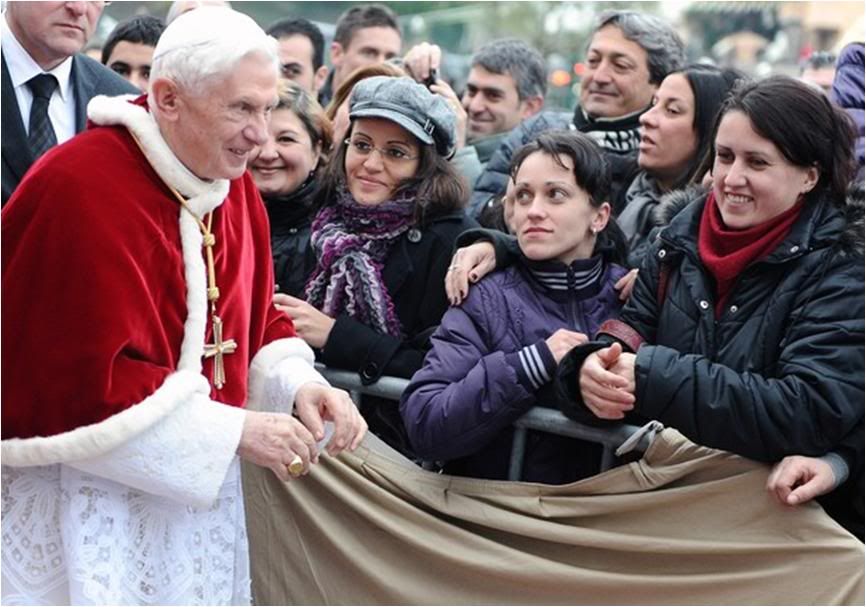
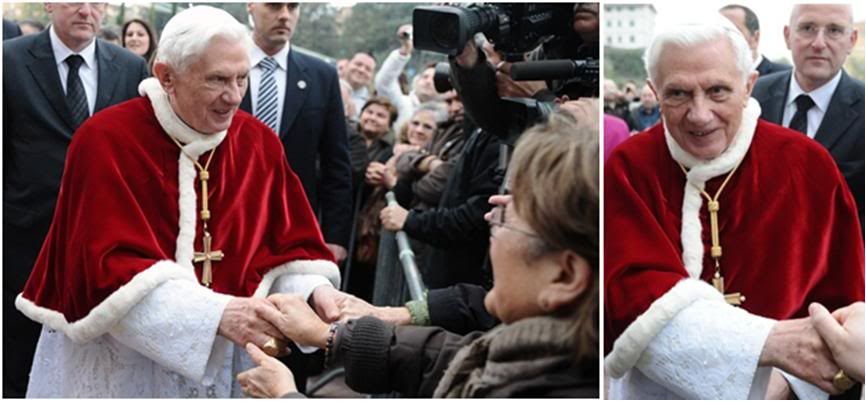
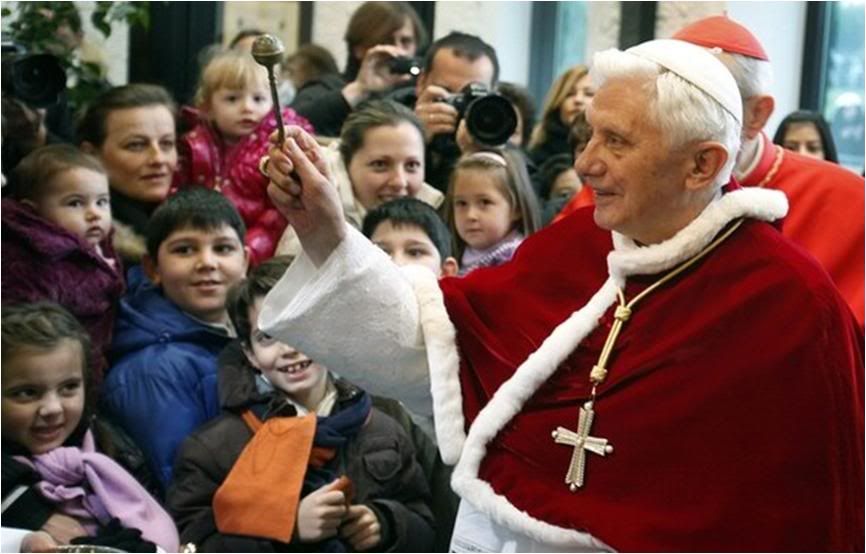
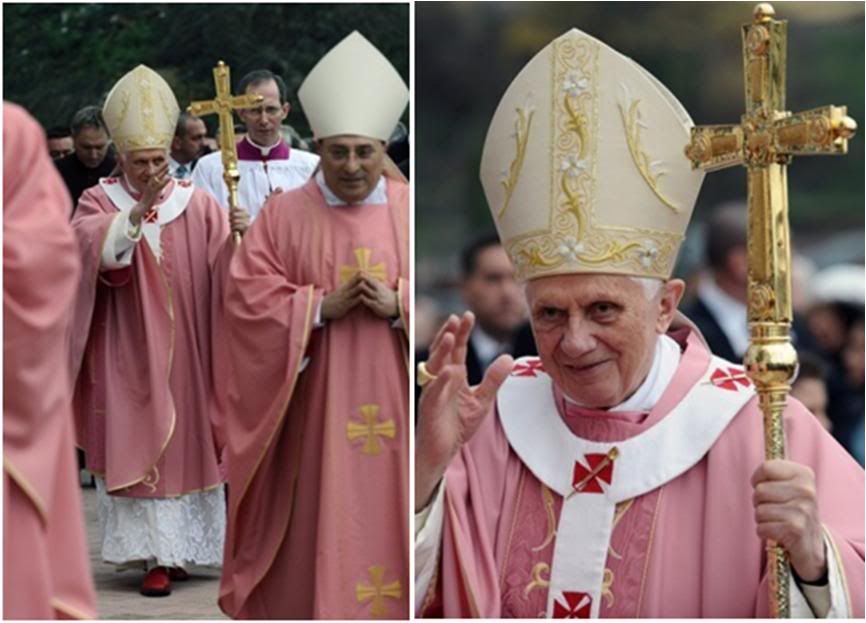
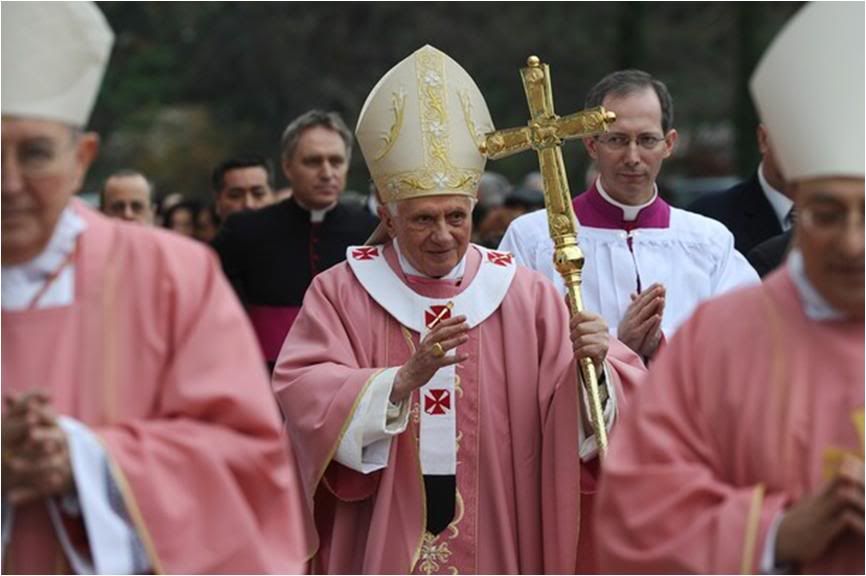
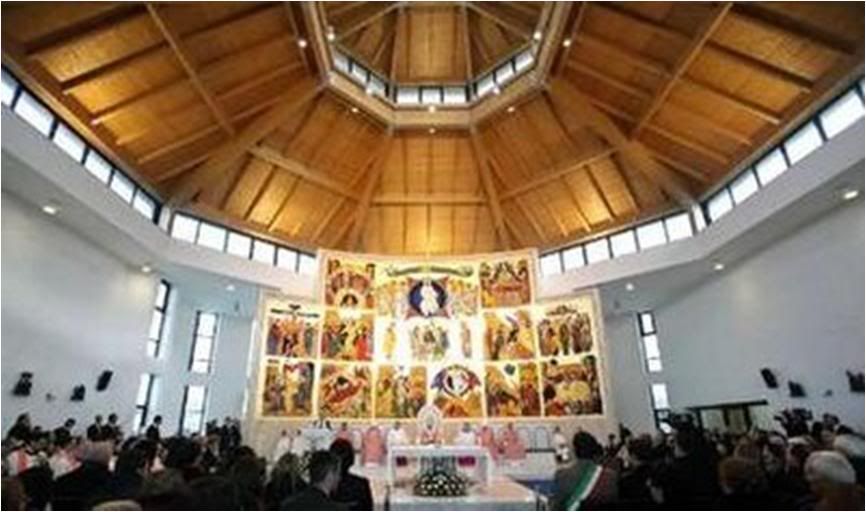
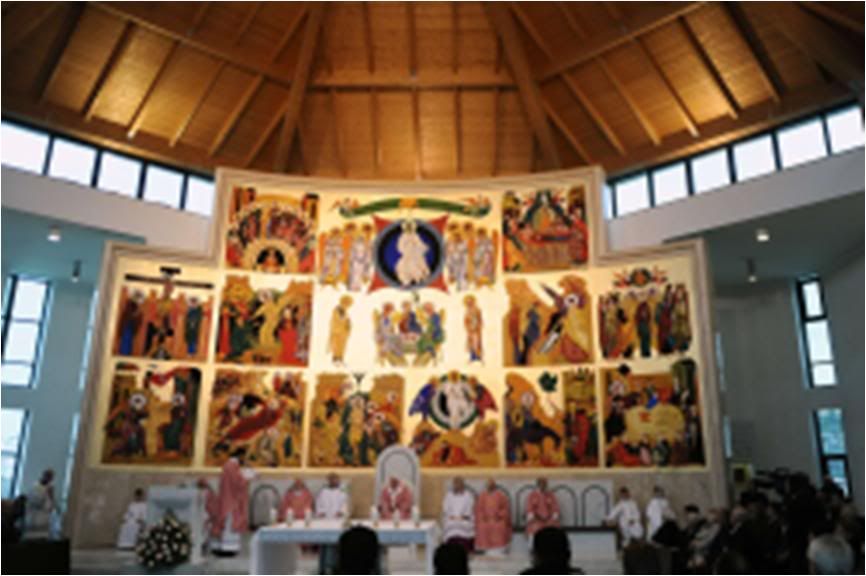
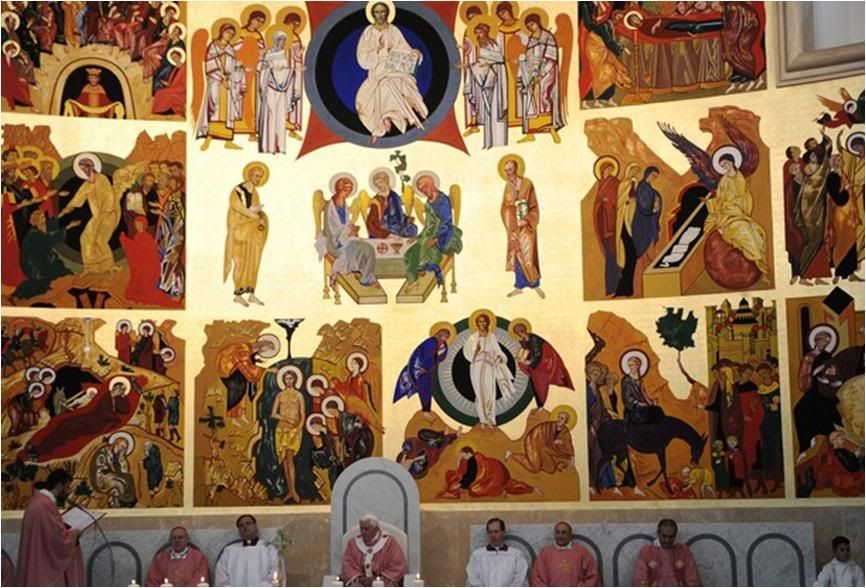
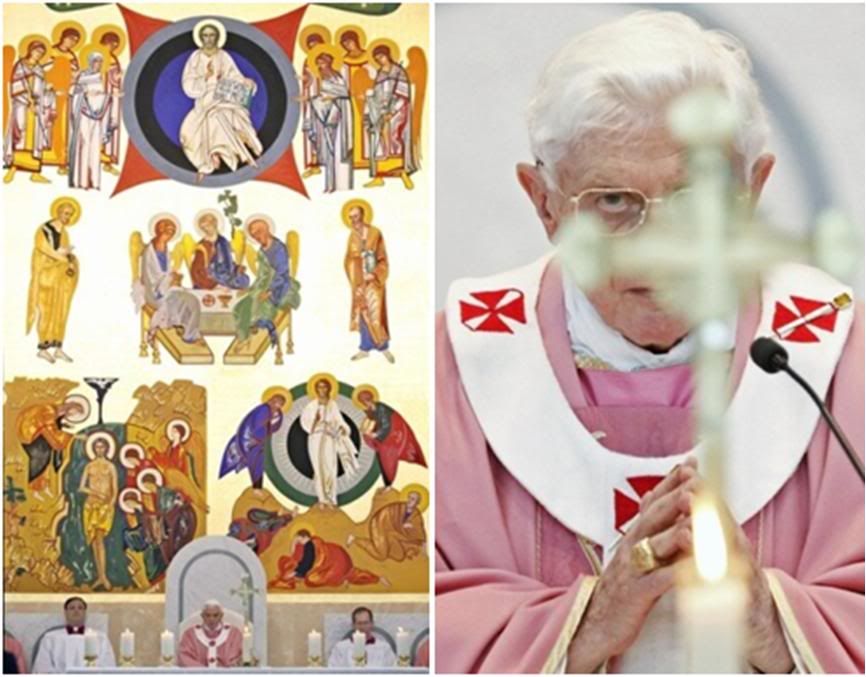 Here is a translation of the Holy Father's homily
Here is a translation of the Holy Father's homily:
Dear brothers and sisters of the parish of San Massimiliano Kolbe:
In following our Lord, you will be living your personal and community life with commitment. Advent is a strong invitation for everyone to increasingly allow God into our lives, into our homes, into our neighborhoods, into our communities, in order to have light in the midst of so many shadows, of all the many labors of every day.
Dear friends, I am very happy to be with you today to celebrate the Lord's Day, on this third Sunday of Advent, the Sunday of joy.
I cordially greet the Cardinal Vicar, the Auxiliary Bishop of this sector, your parish priest, whom I thank for the words he addressed to me in behalf of all of you, and the parish vicar.
I greet everyone who is involved in parish work: the catechists, members of various groups, as well as the many followers of the Neo-Catechumenal Way.
I appreciate very much your decision to make room in this Church for Eucharistic Adoration and I thank you for the prayers you have offered for me before the Blessed Sacrament.
I wish to extend my thoughts to all the residents of this district, especially the aged, the sick, those who live alone and are in difficulty. I remember each and everyone in this Mass.
Like you, I admire this new church and the parochial edifices, and I hope my presence will encourage you to increasingly realize the Church of living stones that you yourselves are. I know the many significant works of evangelization that you are doing.
I exhort all the faithful to give their own contribution to building the community, particularly in the fields of catechesis, liturgy and charity - the pillars of Christian life - in communion with the entire Diocese of Rome.
No community can live as a cell isolated from the diocesan context. It must, instead, be a living expression of the beauty of the Church which, under the leadership of its bishop - and in the parish, under the leadership of the parish priest who stands for the bishop - walks together in communion toward the Kingdom of God.
I address a special thought to families, with the wish that they may fully realize their own vocation for love with generosity and perseverance. Even when difficulties present themselves in conjugal life and in the relationship with their children, spouses should never cease to be faithful to that fundamental Yes that they pronounced before God and to each other on their marriage day, remembering that fidelity to one's vocation demands courage, generosity and sacrifice.
Your community includes many families from central and southern Italy who came in search of work and better living conditions. With time, the community has grown and has been partly transformed by the arrival of many persons from Eastern Europe and other nations.
Precisely because of this concrete situation in your parish, strive to grow more and more in communion with everyone. It is important to create occasions for dialog and to favor reciprocal understanding between persons coming from different cultures, lifestyles and social conditions.
But above all, it is important to involve them in Christian life, through pastoral activity that is attentive to the real needs of each one. Here, as in every parish, one must progress from 'neighbors' to reach even those who are 'distant', in bringing the evangelical presence to the various sectors of life and work.
Everyone must be able to find in the parish adequate ways of formation and to experience that community dimension which is a fundamental characteristic of Christian life. This way, they will be encouraged to rediscover the beauty of following Christ and being part of his Church.
You must therefore be a community united in listening to the Word of God and in the celebration of sacraments, particularly the Eucharist.
In this respect, the current diocesan pastoral verification on the theme "Sunday Eucharist and testimony to charity", is a propitious occasion to understand deeper and live better these two fundamental components of the life and mission of the Church and every single believer - namely, the Sunday Eucharist and the practice of charity.
United around the Eucharist, we can more easily feel that the mission of every Christian community is to bring God's message of love to all men. That is why it is important that the Eucharist always be at the center of the life of the faithful.
I also wish to address a special word of affection and friendship to you, dear children and young people who are listening to me, and to your contemporaries who live in this parish. The Church expects much of you, your enthusiasm, your capacity to look forward, and your desire for making radical choices in life.
Consider yourselves true protagonists in the parish, placing your fresh energies and all your life in the service of God and your brothers.
Dear brothers and sisters, alongside its invitation to joy, the liturgy today - with the words of St. James that we have just heard - also tells us to be constant and patient in awaiting the Lord who comes, and to be together as a community, avoiding complaints and judgments (cfr James 5, 7-10).
In the Gospel, we heard the question from the Baptist in his prison cell - the Baptist who had announced the coming of the Judge who would change the world, now feels that the world has remained the same. Therefore, he wants his disciples to ask Jesus: "Are you then the one who is to come? Or should we wait for another? Is it you or shall we wait for another?"
In the last two to three centuries, many have asked this: "Is it really you? And should the world not change more radically? What have you done?"
And so many prophets, ideologs and dictators have come along, saying, "It is not he! He has not changed the world. We have!" And they have created their empires, their dictatorships, their totalitarianism, that were supposed to have changed the world.
And they did, but in a destructive way. Now we know, that out of their great promises, nothing remains but a great void and great destruction. It was not them [i.e., They were not the awaited savior].
Thus we should look at Christ anew and ask him: "Are you the one?" The Lord, in his silent way, replies: "Consider what I did. I did not cause bloody revolution, I did not change the world with force, but I have lit so many lights that in the meantime constitute a great way of light through the millennia!"
Let us begin here, in our parish: St. Maximilian Kolbe, who offered to die of starvation in order to save a family man. What a great light he has become! How much light has come from this figure who has encouraged others to give themselves, to be close to those who suffer, to the oppressed.
Let us think of Father Damian de Veuster who was a father to the lepers, who lived and died with and for the lepers, and thus brought light to that community. Let us think of Mother Teresa, who gave so much light to persons everywhere, who, after a life without light, died with a smile, because they had been touched by the light of God's love.
We could go on and on, and see how the Lord said in his response to John the Baptist, that it is not violent revolution nor great promises that change the world, but the silent light of truth, of the goodness of God that is the mark of his presence, and which gives us the certainty that we are loved to the very end and that we are not forgotten - we are not a product of chance, but of a will of love.
Thus we can live and feel the closeness of God. "God is near", the first Reading today says. He is near, but often we are distant. Let us get close to him, let us go where his light is present, let us pray to the Lord, and in the contact of prayer, we too can become a light for others.
This is also the sense of the parochial church: to enter here, to enter into a conversation with Jesus, to be in touch with him, the Son if God, so that we too may become one of the many small lights that he has lit, and we can bring this light to the world as it is redeemed.
Our spirit should open up to this invitation, and thus, we can journey with joy towards Christmas, like the Virgin Mary, who awaited in prayer, with intimate and joyous trepidation, the birth of the Redeemer. Amen.
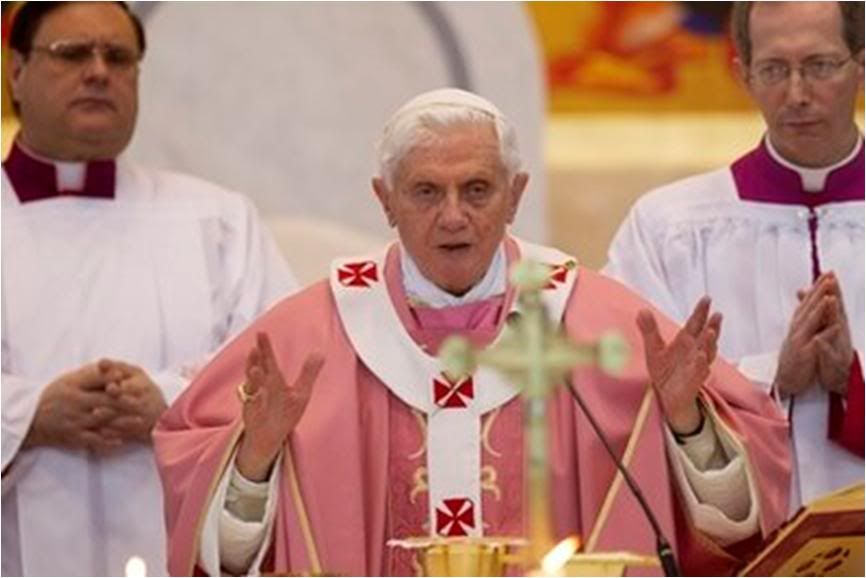
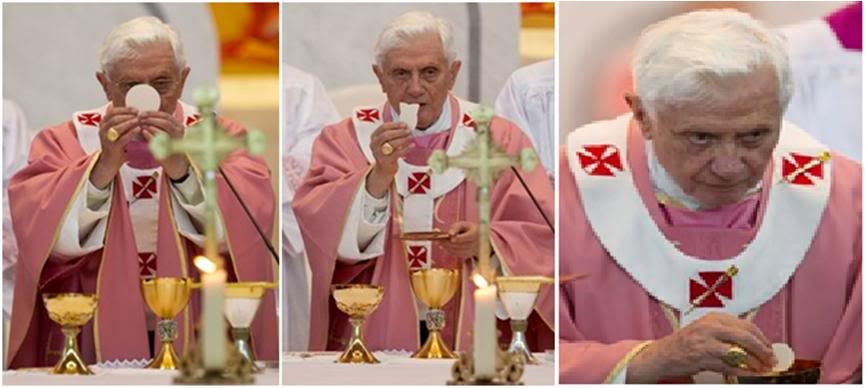
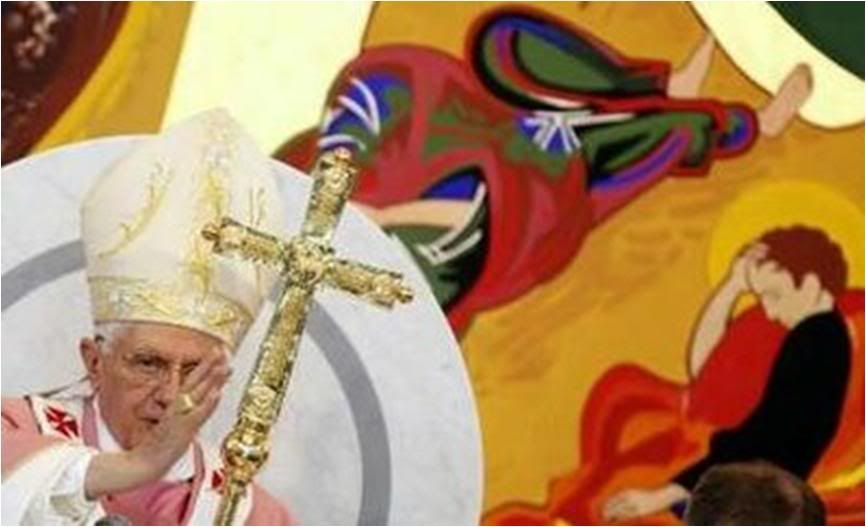
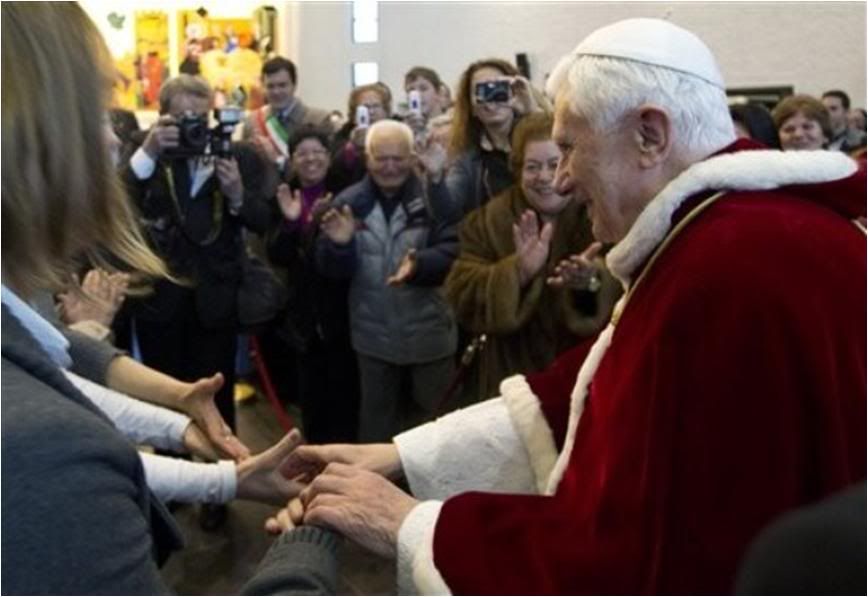
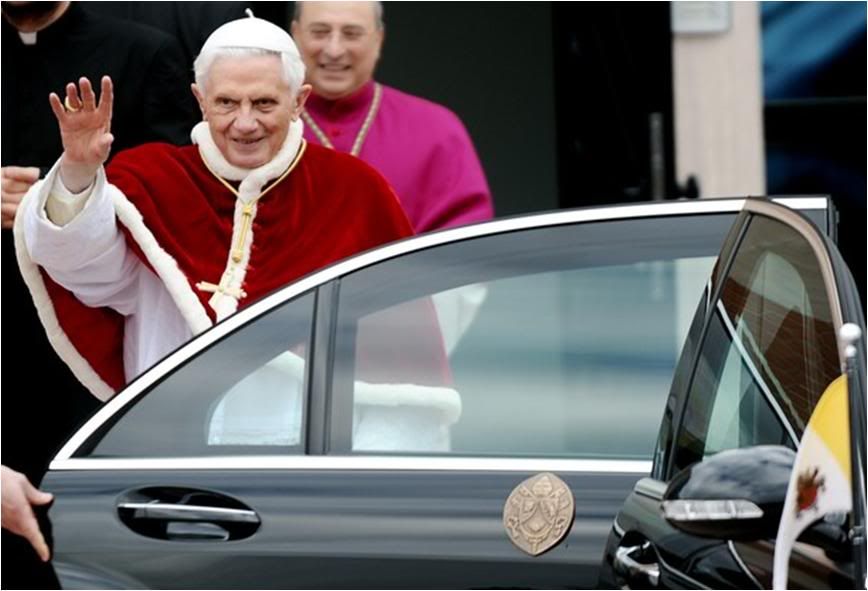
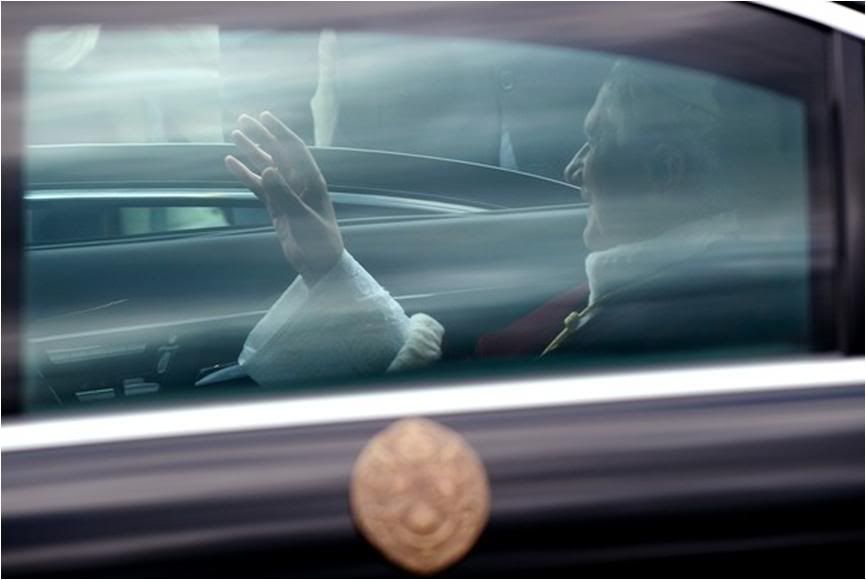
[Modificato da TERESA BENEDETTA 15/12/2010 15:15] |
| |
 12/12/2010 15:56 12/12/2010 15:56 |
|
| | | OFFLINE | | Post: 21.676
Post: 4.311 | Registrato il: 28/08/2005
Registrato il: 20/01/2009 | Administratore | Utente Master | |
|
 AMGELUS TODAY
AMGELUS TODAY
The Holy Father led noontime Angelus prayers in St. Peter's Square after returning from his pastoral visit to the Roman suburb of Prato Fiorito.
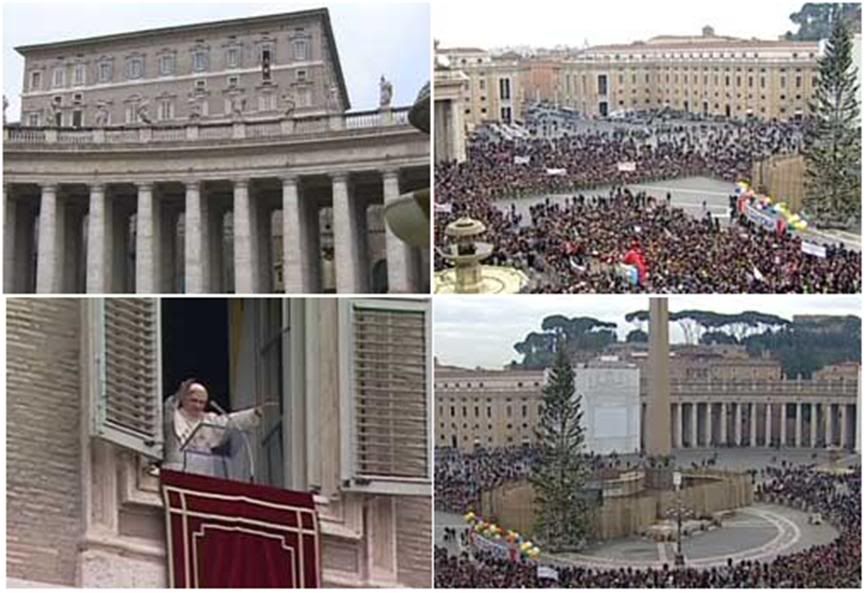 Here is a translation of his words before and after the Angelus:
Here is a translation of his words before and after the Angelus:
Dear brothers and sisters:
On this third Sunday of Advent, the liturgy offers us a passage from the Letter of St. James which opens weith this exhortation: "Be patient, brothers and sisters, until the coming of the Lord" (James 5,7).
I think it is even more important, in our day, to underscore the importance of constancy and patience, virtues that belonged to the normal baggage of our fathers, but that are less popular today, ina world that instead exalts change and teh capacity to adapt to ever newer and more diverse situations.
Without taking away anything from these aspects, which are qualities of the human being, Advent alls on us to potentiate that interior tenacity, the resistance of teh spirit that allows us not to despasir of waiting for a good that is late in coming, but rather to await it by preparing for this coming with active trust.
"See how the farmer waits for the precious fruit of the earth", St. James writes, "being patient with it until it receives the early and the late rains. You too must be patient. Make your hearts firm,
because the coming of the Lord is at hand" (James 5,7-8).
The comparison with the peasant is very expressive: he who sows his field faces months of patient and constant waiting, but he knows that meanwhile, the seed will complete its cycle, thanks to the rains of autumn and spring.
The farmer is not a fatalist, but he is the model for a mentality which unites faith and reason in a balanced way, because on the one hand, he knows the laws of nature and does his work well; and on the other hand, he trusts in Providence, because some fundamental things are not in his hands, but in God's hands. Patience and perseverance constitute a synthesis of human commitment and trust in God.
"Cheer up your hearts", Scripture says. How can we do this? How can we make our hearts stronger, already fragile as they are, and made even more unstable by the culture in which we are immersed?
We do not lack for help: We have the Word of God. Indeed, while everything passes and changes, the Word of the Lord does not pass away. If the events of life make us feel lost and every certainty seems to crumble, we have a compass to find our orientation, we have an anchor so that we do not end up drifting.
The model offered us in today's liturgy is that of the prophets, namely, those persons whom God has called on to speak in his name. The prophet finds his joy and his strength in the Word of the Lord, and even as men often seek happiness through ways that prove to be wrong, he announces true hope, that which does not disappoint because it is founded on fidelity to God.
Every Christian, by virtue of baptism, receives the dignity of the prophet: May everyone rediscover it and nourish it, with assiduous listening to the Divien Word. May this be obtained for us by the Virgin Mary, whom the Gospel calls 'blessed' because she believed in teh fulfillment of the words of God. (cfr Lk 1,45).
After the prayers, he said this:
My first greeting goes today to the children and young people of Rome, who have come here for the traditional blessing of the Bambinelli for their Nativity scenes.
Dear young friends, when you place the Baby Jesus in a cave or in a stable, say a prayer for the Pope and his intentions. Thank you.
I also greet your parents, teachers and catechists, and I thank the Centro Oratori Romani for the initiative, as well as the friends of the pediatric dispensary Santa Marta.
I also wish to remind you that next Thursday afternoon, December 16, I will celebrate in St. Peter's Basilica the Liturgy of Vespers with the students of the Roman universities, in preparation for the Holy Nativity.
In English, he said this:
I welcome all the English-speaking pilgrims and visitors present for our Angelus prayer. The liturgy of this Third Sunday of Advent, marked by joyful expectation of the Lord’s coming, invites us to open our eyes to the many signs of Christ’s saving power in our midst.
May these days of preparation for Christmas be for all of us a time of attentiveness to God’s word, genuine conversion and interior renewal. Upon you and your families I invoke joy and peace in Jesus our Saviour.
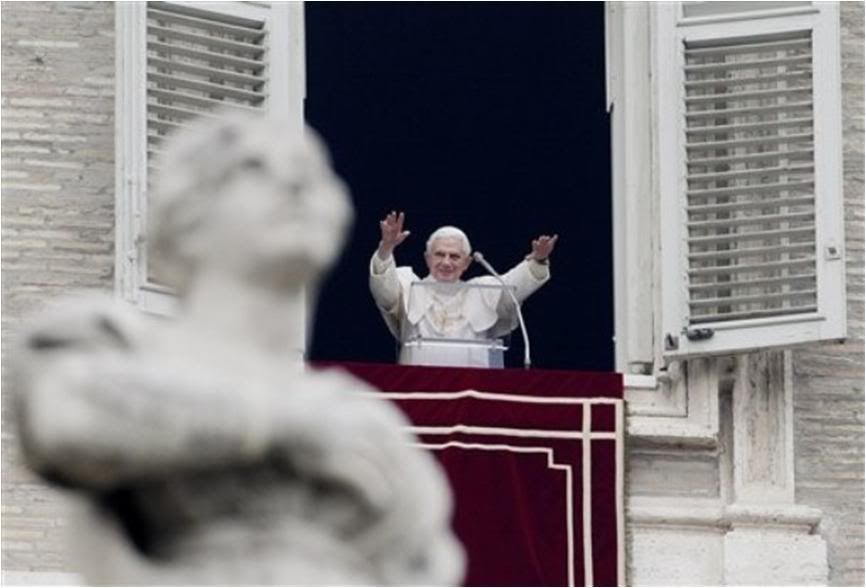 'Today's Gospel teaches
'Today's Gospel teaches
patience and perseverance'

12 DEC 2010 (RV) - Pope Benedict arrived back at the Vatican Sunday in time for the recitation of the Angelus, after a a pre-Christmas pastoral visit to the Roman parish of St. Maximilian Kolbe.
For Italian children, the third Sunday of Advent is a very special day to be in St Peter’s Square as it is the time when the Holy Father blesses the 'Bambinelli' (Baby Jesus) images for the Nativity scenes in their homes.
On this rather chilly Sunday, an estimated 25,000 people packed into the square which included around 2 thousand children.
Greeting them in particular after the Marian prayer the Pope said, "When you place your Baby Jesus in a cave or stable, say a prayer for the Pope and his intentions."
Before reciting the Angelus prayer Pope Benedict described Advent as a time that encourages greater use of "that inner toughness, that strength of soul that allow us not to despair, in our waiting for a good that is slow to come, but await it, he said, indeed, prepare for it with confidence".
“May these days of preparation for Christmas be for all of us a time of attentiveness to God’s word, genuine conversion and interior renewal.”
The Pope also drew inspiration from a passage in the Letter of St. James, which says “Be patient, therefore, brothers, until the coming of the Lord."
Referring to this text he underlined the importance of perseverance and patience, virtues he said, that belonged to the regular abilities of our ancestors, but are now less popular in a world that instead exalts change and the ability to adapt to new and different situations.”
The Pope then called on people to open their hearts, which, he said, can become fragile by events in daily life, to the Word of God which does not pass and anchors us so as not to go adrift.
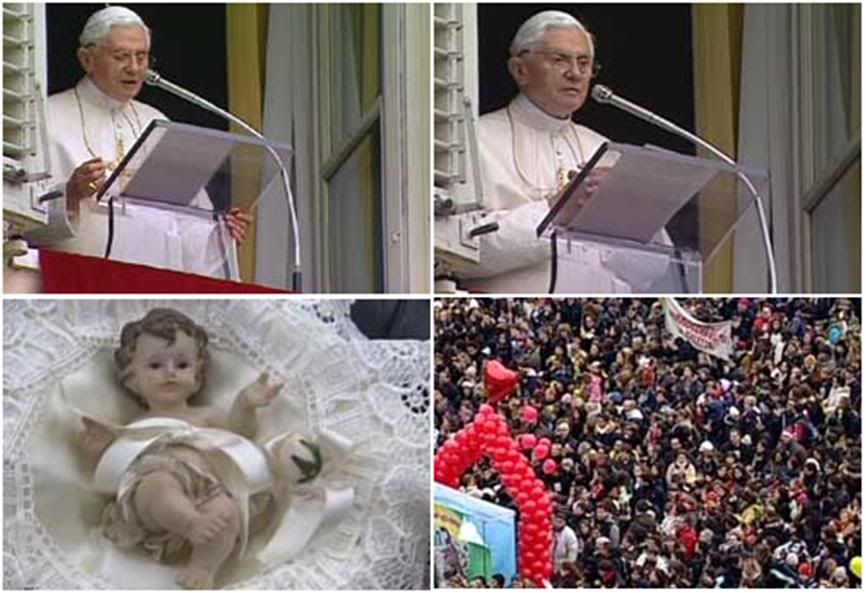
[Modificato da TERESA BENEDETTA 12/12/2010 20:02] |
| |
 13/12/2010 08:43 13/12/2010 08:43 |
|
| | | OFFLINE | | Post: 21.677
Post: 4.312 | Registrato il: 28/08/2005
Registrato il: 20/01/2009 | Administratore | Utente Master | |
|

 Once again, I must thank Lella and her blog
Once again, I must thank Lella and her blog

for the following two articles - which are not online - in which Andrea Tornielli and Paolo Rodari restate their case for Benedict XVI as they have advanced in their regular reporting on the Vatican, and in their recent book ATTACCO A RATZINGER. The articles appear in the December issue of the magazine FORMICHE, a journal of politics, economics, international affairs and culture, which has a special section this month entitled "Why an 'inconvenient' Pope is in the crosshairs". The rest of the articles give an idea of the special:
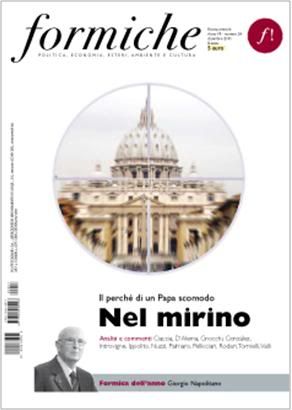
Un nodo a tre fili - Marco Andrea Ciaccia
La teoria dei cerchi concentrici - Paolo Rodari
La risposta della serenità - Massimo Introvigne
Una bussola nel difficile rapporto con i media - Norberto González Gaitano
La “glasnost” finanziaria dello IOR - Gianluigi Nuzzi
Le due chiese - Alessandro Gnocchi e Mario Palmaro
La necessaria virtù dell’ingerenza - Massimo D’Alema
Un magistrale magistero - Benedetto Ippolito
B-XVI, cronaca di un papa scomod - Aldo Maria Valli
La realtà supera la mistificazione - Andrea Tornielli
1848. Anche quello fu un attacco - Angela Pellicciari
Benedict XVI:
Reality overwhelms the distortion
by Andrea Tornielli
Translated from the December 2010 issue of

Among the most striking aspects about Benedict XVI are his humility and capacity for saying words that go straight to the heart of the men and women who listen to him.
Even if it is said - often exaggerated and giving the statement too much significance - that John Paul II spoke more with his actions, while his successor is the Pope of 'words', the reality is quite different, if one looks more closely.
Indeed, not only is it certain that Papa Wojtyla was also a Pope of words, but one who used strong words, sometimes inconvenient, and proclaimed with all the force he was capable of.
It is equally true that Pope Benedict, before he even speaks, already impresses by his humility and gentleness. This is best seen in his international travels, especially those that are pre-announced as being 'the most difficult' and 'full of traps' - such as that to
France and to the United Kingdom - during which, instead, Benedict's manner immediately 'resolved' the fears and tensions expressed before the visit.
Unfortunately, even before he became Benedict XVI, a negative prejudice - which in technical communications terms might be called a frame - had weighed over Joseph Ratzinger who, since the mid-1980s had been portrayed as the Panzerkardinal, retrograde, and nostalgic for the past.
[Not having been aware of Joseph Ratzinger before 2005, I would deduce that the negative image came primarily after the publication of The Ratzinger Report in 1985, which apparently shone the spotlight on him as never before on a cardinal of his rank, for having dared to describe the state of the Church as he did.
George Weigel in his biography of John Paul II credits the book for having inspired John Paul II to call the special Synodal Assembly of 1985 to examine how the Church had 'received' the teachings of Vatican II in the 20 years since it ended. Meanwhile, Cardinal Ratzinger's misgivings were interpreted by the Vatican-II 'spiritists' as a desire for a Restoration. no less, of the 'pre-Conciliar Church'. The book apparently caused such a furor in Italy that a leading cardinal complained in public that the Synodal Assembly was not about a book!... One might say that just as in 1968, Ratzinger's Introduction to Christianity had spelled out orthodox Christianity in basic doctrinal terms, the Ratzinger Report was his analysis of the Church in terms of that fundamental theology and the ecclesiology it implied.]
The media ended up contrasting him with John Paul II - to whom he had been a most faithful and much appreciated collaborator, to the point that Papa Wojtyla refused to accept the thrice-offered resignation after he turned 75 of the man who had been alongside him longer than any other in the Roman Curia.
This negative prejudice, built through a media campaign by ecclesial dissenters, still weighs on him today, unfortunately, and along with other factors (among which, the 'inadequacy' of the Curial machine in many cases), has mostly prevented the true message of the Pope from being transmitted to the public.
"Being Christian is not the result of an ethical choice or a lofty idea, but the encounter with an event, a person, which gives life a new horizon and a decisive direction" - These words at the start of his first encyclical, Deus caritas est, define better than any other the heart of Papa Ratzinger's message, the thread that runs through his Magisterium.
Joseph Ratzinger has chosen as the keys to his Pontificate the words that most recur in his discourse - love, joy, truth, beauty. It is significant that from his first message urbi et orbi, in the homily he gave at the Sistine Chapel the morning after his election, the new Bishop of Rome said, "In carrying out his ministry, the new Pope knows that his task is to make Christ's light shine out before the men and women of today: not his own light, but Christ's".
These words pre-announced the style of his Pontificate: Papa Ratzinger does not want to be the protagonist, but to make the true Protagonist emerge.
Am important indication, in this regard, took place in the first months of his Pontificate. Starting with World Youth Day in Cologne (August 2005), and in many other occasions afterwards. Benedict XVI has wanted major Church events to end with the Eucharistic Adoration, when stage center is held not by the Vicar of Christ, but by the True Protagonist.
It is along the same line that one must consider Papa Ratzinger's Magisterium on the liturgy. Well aware that continual changes imposed from above are not appropriate for liturgy and are difficult to accept and assimilate, Benedict XVI has chosen the way of teaching by example.
Papal Masses have gradually been transformed: the Crucifix has been brought back to its centrality on the altar, in front of the celebrant, and there is more use of Gregorian chant. [ Not to mention Latin for the Canon of the Mass!]
In 2007, the Pope restored full 'citizenship' to the traditional Mass which was used until 1970. With this, the Pope wished, not to return to the past nor to nullify the post-conciliar reform of the liturgy. It was to promote a reonciliation and reciprocal enrichment so that the celebration of the ordinary Form - which was is, and remains that which followed Vatican II - can rediscover the beauty and sacredness if the old Mass; and those who prefer the Extraordinary Form, which is as valid as the new Mass, can discover the richness of the patrimony of Sacred Scripture introduced by the reform.
Thus the Pope is doing everything to promote the healing of old wounds and reconciliation. That is how one musr read his decision to revoke the excommunication of the Lefebvrian bishops and to issue the apostolic constitution Anglicanorum coetibus for the Anglican communities who wish to be in full commuinion with Rome and in doing so, who can retain their traditions.
"The Church", he has said, "is not our Church, but his, the Church of God. The servant must account for how he has managed the good that has been entrusted to him. We do not bind men to us, we do not seek power, prestige nor esteem for ourselves".
Moreover, he says, the Church does not consist of her organizational structures, nor does it live through conferences and commissions. As he said in Lisbon in May 2008: "Often we are anxiously preoccupied with the social, cultural and political consequences of the faith, taking for granted that faith is present, which unfortunately is less and less realistic. Perhaps we have placed an excessive trust in ecclesial structures and programmes, in the distribution of powers and functions; but what will happen if salt loses its flavour?"
Another important thread that runs through the Magisterium of Benedict XVI is the relationship between faith and reason, which was the focus of his Regensburg lecture. The nucleus which he owuld take up in many other documents and interventions was the synthesis of faith and reason as a common ground for an authentic dialog between the Muslim world and Christianity.
Benedict XVI has explained that dialog cannot be above all a question of politics or diplomacy, but the search for the fundamental rationale held in common by all men.
Speaking of reason itself, the Pope has shown how our time - starting with the Enlightenment, which did have some merit - has been characterized by a restricted and limited concept of reason, a self-limiting one, which claims that nothing can be said about God, about the ultimate questions that agitate man's heart, on that which is transcendent.
All this, the sense of religion, is not censured by the modern era, which relegates it however to the limbo of subjectivity, claiming that there can be no reasonable and objective knowledge of it. And so faith ends up being considered irrational and subjective.
This reflection also includes the reference often made by Pope Benedict XVI to natural moral law, namely, man's capacity to tell good from bad. He intends it to favor dialog and confrontation between believers and non-believers, not only on matters of faith, but also those that have to do with ethical emergencies in order to construct a common 'grammar'.
Nor must other important aspects of this Pontificate be forgotten, though they are not as well emphasized because they do not fit the prejudices about a conservative Pope.
In the social encyclical Caritas in veritate, Papa Ratzinger has included among the social emergencies the anthropological question and ethical issues, thus, another step of reconciliation, going beyond the consolidated divisions that would have 'proogressivist' Christians dedicated to the poor and to social works, whereas the 'conservatives' are concerned only with the defense of life and the family.
But the defense of life and the family are also social issues. And we must not forget the closeness that this Pope has always manifested towards the poor and the very least of people, in the first five years of his Pontificate.
We also must not forget that in his Magisterium one also finds strong words against savage capitalism and a globalization that ends up further impoverishing those who are already poor. His invitation to charity, to brotherhood, to sharing resources, and a more moderate lifestyle that is attentive to the needs of the very least among our brothers, are central in his teaching.
He has also reflected often upon the need for a more vigilant management of the resources of creation. His appeal for a human ecology, for the safeguarding of nature which God entrusted to man, is one of the other constants in the first 'lustrum' of his Pontificate.
Even if at the media level, the existence of negative prejudice ends by reporting only that which is compatible with the cliche
of the conservative Pope.
The theory of the concentric circles
against Benedict XVI
by Paolo Rodari
Translated from the December 2010 issue of

The first five years of Benedict XVI's Pontificate were characterized by attacks coming from many sides. Seen closely, one must speak of three concentric circles.
First of all, circles and power groups for whom it is convenient to 'depotentiate' the message of the Church, accusing her before the public tribunal and exploting elements that are indisputably serious such as the scandal of priestly abuse against minors.
The second circle is the internal dissent in the Church against the Pope. Papa Ratzinger, often defined by them as mean, conservative and retrograde, is not seen favorably by a part of the Church that is always ready to accuse him of not wishing to reform the Church by not adapting it substantially to the dictates of the world.
The third circle is composed of the involuntarily self-generated attacks at the Vatican as a result of many acts of imprudence and frequent errors by the Pope's co-workers.
Three circles that all lead to one conclusion: Papa Ratzinger, whatever you think of him, is constantly under attack.
The most acute crisis began last spring, with the introduction of accusations that the Pope himself had covered up episodes of pedophilia in the clergy.
But on March 10, when the criticisms were at their worst, it was the Pope himself who spoke up in St. Peter's Square - in which he explained his idea of governing the Church. He cited the example of St. Bonaventure who had said that "governance is not simply doing, but above all, thinking and praying".
"For Bonaventure," he said, "the Church is not governed simply through orders and structures, but by guiding and enlightening souls".
Since March 19, the Pope has not picked up the argument, But in the face of worsening accusations over Church leadership, he responded by
putting into practice the teaching of the great Franciscan theologian.
And that is, by sharing his own 'enlightened thought' in his pastoral letter to the Catholics of Ireland.
Words are the primary means through which the Pope leads and guides the Church, aware that the presentation of authentic Christian thought is the true 'sword' agains the world.
Of course, Papa Ratzinger is not the first (and will not be the last) Pope to be attacked. Furious reactions to papal thinking have happened in the past. But what bas been the determining factor for the attacks against Pope Benedict XVI?
The notion that this is a Pope who wants to turn back Church affairs to the way it was before the Second Vatican Council, to the Tridentine era [which had lasted since the mid-16th century Council of Trent inspired by the Counter-Reformation], and that his thoughts are allegedly retrograde with respect to contemporary culture.
Paul VI wrote Humanae vitae, and after having been initially hopeful about the new encyclical, the liberal media suddenly branded the Pope as the devil.
"The Pope is the devil," wrote Vittorio Gorresio in 1973. "The turnabout of Paul VI", wrote L'Espresso's Vaticanista, ex-priest Carlo Falconi in 1978, meaning that with Humanae vitae, Paul VI was placing a 'pre-Conciliar' brand on his Pontificate.
The same accusations would be made against John Paul II. Until 1989, Papa Wojtyla represented hope for everyone. After the fall of the Berlin Wall, it seemed like his thought no longer mattered, and the criticisms started.
With Ratzinger, it all started on December 22, 2005. In his first address to the Roman Curia, he launched a challenge to those who want a Church not so much 'for the world', or 'close to the world',
but outright 'of the world'.
Speaking of Vatican II, the Pope said it was not a rupture with the past. He pointed out that those who have this interpretation align with "the sentiments of the mass media, and even part of modern theology".
"It was on December 22, 2005, that everyone finally understood who Ratzinger is", says the dean of Vaticanistas, Benny Lai. "Until then, there were those who still hoped that the 'first' Ratzinger, the one they considered progressive, would 'return'. But it was not so".
But he adds, "Even during Vatican II, many made the mistake of considering him a progressive theologian. Even the late Cardinal Giuseppe Siri thought so. But then Ratzinger showed soon enough that he was not at all what he had been labelled with. It is his perceived 'change to conservatism' that still causes much annoyance to his liberal critics in the Church and outside it".
Since that address to the Roman Curia to the present, 'Ratzinger thinking' has manifested itself in many forms that have usually unleashed indignant reactions from his critics.
On the way to Africa in 2009, he said that AIDS cannot be conquered by distrbution of condoms alone - and the secular intelligentsia of half of Europe set upon him. Nevermind that he made a correct statement: to fight AIDS requires educating human beings so that they may start considering their own body in a different way. Namely, not in the narcissistic and self-referential expression of human sexuality.
Another major reaction to Benedict XVI took place earlier in Regensburg. He spoke on the nexus between religion and civilization, pointing out that conversion through violence is against God's reason.
But the citation of a statement by the Byzantine emperor Manuel II Paleologue - who said that Mohammed had introduced nothing but
"things only evil and inhuman, such as his command to spread by the sword the faith he preached" - unnleashed the fury of the Muslim world. And yet the Pope's words live on. Indeed, the Regensburg lecture has borne good fruit.
Ratzinger provokes strong reactions not only when he speaks, But even when he takes decisions that affect the very heart of the life of the Church.
Among these, the motu proprio Summorum Pontificum which liberalized the use of the traditional Mass, and lifting the excommunication of the four bishops consecrated by Mgr. Marcel Lefebvre against the express wishes of John Paul II.
Revival of the taditional Mass was particularly opposed in France. "What would you say to those in France who fear that Summorum Pontificum marks a step back from the great intuitions of Vatican II?", the Pope was asked in September 2008 on his way to Paris.
"It is unfounded," he said. "Because this motu proprio is simply an act of tolerance, with pastoral ends, for persons who grew up in the traditional lutrgy, who love it and know it well, and wish to live using this liturgy".
The accusation always goes back to this: that the Pope wishes to turn back Vatican II. And that therefore, he is against modernity. It's the same accusation made when he lifted the Lefebvrians' excommunication.
To which the Pope replied that "the magisterial authority of the Church cannot be frozen as of 1962" [which is, in effect, what the Lefebvrians advocate].. And to those who claim to be the great defenders of Vatican II, he said "that whoever wants to be obedient to Vatican II should accept the faith as it has been professed down the centuries" and that "you cnanot cut off the roots from which the tree lives".
There's also part of the Protestant world that does not understand Ratzinger. In November last year, Benedict XVI promulgated the apostolic constitution Anglicanorum coetibus by which Anglican groups who wish to convert to Catholicism can do so. The Pope had explained his move as a response to a request that had been presented [for almost two decades] by traditional Anglicans.
But many Anglicans and even part of the Catholic world did not udnerstand, and accused him of poaching on the left, meaning among those Christians who have become disaffected by the progressive and liberal trends of their own Churches.
When he visited the United Kingdom last September, he told the bishops of England and Wales: "I ask you to be generous in carrying out the directives of the Apostolic Constitution, in order to assist those Anglican groups who want to enter into full communion with the Catholic Church. I am convinced that these groups will be a blessing for the entire Church".
Why do these Anglicans want to return to full communion with Rome? Because a church which opens itself to the world mindlessly by accepting woemn's ordination and gay marriages does not make sense.
The Pope is fighting for a Church anhcored in the truth, and because of this, many are hostile to him.
[Modificato da TERESA BENEDETTA 13/12/2010 13:27] |
| |
 13/12/2010 13:11 13/12/2010 13:11 |
|
| | | OFFLINE | | Post: 21.678
Post: 4.313 | Registrato il: 28/08/2005
Registrato il: 20/01/2009 | Administratore | Utente Master | |
|
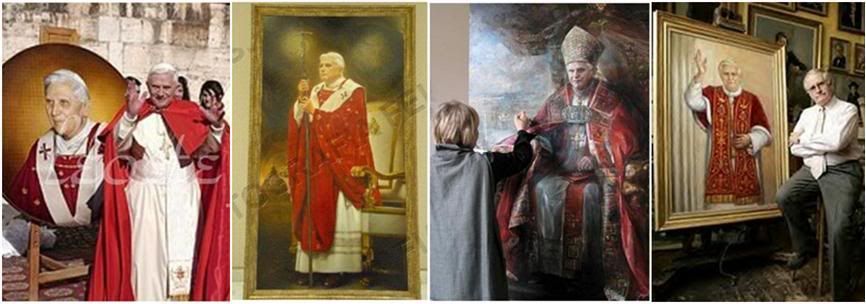 Painting the Pope
There's a new portrait of Benedict XVI now (below, left), commissioned for the Institut Papst Benedikt XVI in Regensburg, for which I am not lighting any candles. Personally, I think that in an age when taking photographs has become possible for anyone, even a two-year-old who can handle a cellphone, the art of portraiture has become almost superfluous. It was most useful in the past before photography was invented, but afterwards, portraiture has become more a platform for the artist to express himself rather than to portray the subject (not to mention an ego trip for those subjects who commission the portrait themselves). However, it's still painted portraits that they hang in portrait galleries and on institution walls, whereas photographs are mostly relegated to photo galleries, so...
Painting the Pope
There's a new portrait of Benedict XVI now (below, left), commissioned for the Institut Papst Benedikt XVI in Regensburg, for which I am not lighting any candles. Personally, I think that in an age when taking photographs has become possible for anyone, even a two-year-old who can handle a cellphone, the art of portraiture has become almost superfluous. It was most useful in the past before photography was invented, but afterwards, portraiture has become more a platform for the artist to express himself rather than to portray the subject (not to mention an ego trip for those subjects who commission the portrait themselves). However, it's still painted portraits that they hang in portrait galleries and on institution walls, whereas photographs are mostly relegated to photo galleries, so...
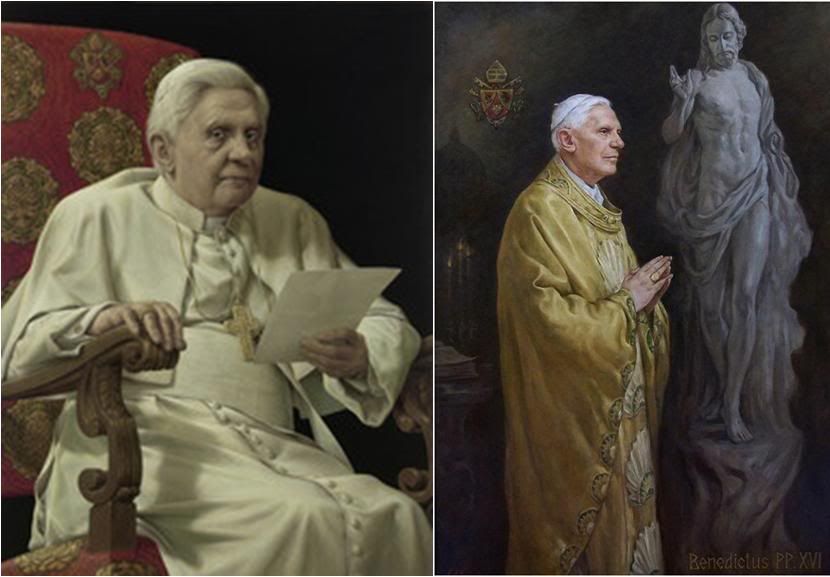 Above, left: Portrait by Michael Triegel, 2010; right, by Igor Babailov. commissioned for the Pope's visit to the USA in 2008.
German artist portrays Benedict
Above, left: Portrait by Michael Triegel, 2010; right, by Igor Babailov. commissioned for the Pope's visit to the USA in 2008.
German artist portrays Benedict
as wrinkled, skeptical figure
By Catherine Hickley

Dec 12, 2010
“Ah, so you’re my Raphael,” is how Pope Benedict XVI greeted the German artist Michael Triegel when they met at the Vatican this year.
Triegel, 41, had been commissioned by the Bishop of Regensburg to paint the pope’s portrait for the foyer of the Institut Papst Benedikt XVI in Regensburg, which studies, collates and prepares for publication the Pope’s written works.
The Pontiff didn’t sit for him exclusively: Triegel attended a general audience that allowed him to sketch 83- year-old Benedict. The realistic yet sympathetic result is on show for the first time in an exhibition of Triegel’s work at Leipzig’s Museum der bildenden Kuenste. The show, “Verwandlung der Goetter” (Metamorphosis of the Gods), displays 70 paintings from 1994 to 2010, and runs through Feb. 6, 2011.
The portrait shows Benedict seated in a high-backed red chair with carved wooden arms, his face turned slightly to the left, against a plain black background. The wrinkles, red veins and shadows under his eyes reveal fatigue and age. His posture is hunched and elderly, more vulnerable than regal.
His thin lips are a millimeter apart, exposing a chink of teeth that suggests a hint of wiliness. Looking up from a paper held in his left hand, his eyes observe the viewer with curiosity, intelligence and some mistrust.
Like Raphael’s 1511 portrait of Pope Julius II, in the National Gallery, London, the trappings of office are absent. Benedict wears a simple white skullcap that almost merges with his hair, a plain white cassock and a heavy gold cross.
It’s a good, if old-fashioned, portrait -- far from the sinister hysteria of Francis Bacon’s screaming popes. The personality of the subject is the focus [In which case, Triegel chooses to focus Benedict XVI's least obvious personality traits for this portrait, though it is an expression occasionally caught in routine photopgrahy of the Pope.], making Benedict’s ironic Raphael comparison appropriate,
Triegel, who calls Raphael his “patron saint,” is an old-fashioned kind of painter. His work is characterized by exquisite craftsmanship, biblical and mythological themes and a strong resemblance to Italian Renaissance masterpieces. What’s more, he paints altarpieces, sometimes works on commission, and counts the Catholic Church as an important client.
Judging from his reviews, Triegel said, “you can’t be more provocative.” He has come in for some scathing attacks from German critics for traditionalism and lack of originality.
Born in Erfurt, Triegel lives and works in Leipzig and is considered a member of the “Neue Leipziger Schule” group of artists, along with Neo Rauch and Tilo Baumgaertel. Like them, he has a studio in the former cotton-spinning factory, the Leipziger Baumwollspinnerei.
Triegel isn’t christened and has no affiliation to any church -- not unusual for someone who grew up in communist East Germany. Draconian travel restrictions meant that he didn’t visit Italy until 1990. Still, the influence of painters like Raphael, Da Vinci and Bellini on his work is unmissable.
His “Last Supper” immediately conjures up Leonardo’s, with its white-clothed table stretching across the canvas and a triple-paned window behind. Yet Jesus is the only person there, and his face is a blank. A mysterious empty black screen looms behind him, and a string of fruit is suspended from above. Five empty water glasses are scattered along the table -- the only food is a single cherry and an egg.
Triegel says he “would like to have a faith” and his art reflects “a yearning for something beyond the rational.” It seems the quest is still on: There’s a disconcerting emptiness to his work. Figures are often nothing more than empty swathes of cloth, wooden puppets or marble statues straining to escape their bonds of stone and string.
His visual language is familiar, yet there’s always something in Triegel’s paintings that’s new and thought- provoking. In his “Annunciation,” Mary isn’t reading as the angel arrives. She’s lying flat on her back, naked and exposed, on crisp white cloths stretched across a trestle table. It’s as though she’s about to undergo a primitive medical procedure, or even be served up for dinner. [YUK!]
Previous portraits of Benedict XVI with photos available online:
From left: Giuseppe Sartini's 2005 portrait commissioned as the basis for the mosaic of Benedict XVI now displayed in the papal gallery of mosaic portraits along the upper walls of the Basilica of St Paul outside the Walls; Sartini's full-length portrait of the Pope, also done in 2005; Natalia Tsarkova, 2007; and Michael Oakes (UK), 2007. I believe the Pope 'sat' specially only for Sartini.
 When will a portrait painter capture his joy????
When will a portrait painter capture his joy????
 Some snapshots of the Pope taken in recent days cropped to match his famous boyhood photo:
Some snapshots of the Pope taken in recent days cropped to match his famous boyhood photo: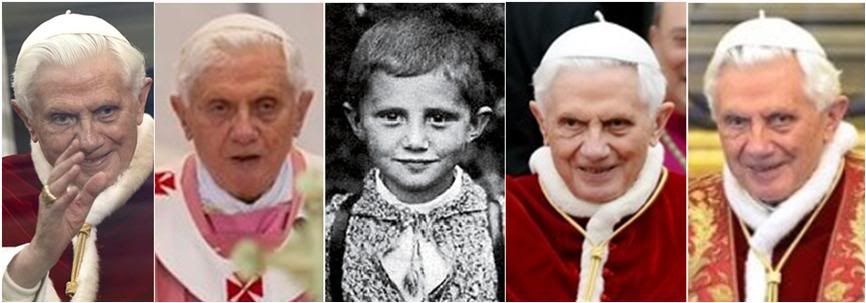
[Modificato da TERESA BENEDETTA 13/12/2010 15:53] |
| |
 13/12/2010 13:23 13/12/2010 13:23 |
|
| | | OFFLINE | | Post: 21.679
Post: 4.314 | Registrato il: 28/08/2005
Registrato il: 20/01/2009 | Administratore | Utente Master | |
|

 Monday, December 13, Third Week of Advent
Monday, December 13, Third Week of Advent
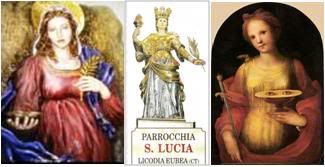 ST. LUCIA (Sicily, 283-304), Virgin and Martyr
ST. LUCIA (Sicily, 283-304), Virgin and Martyr
Born to a wealthy family, Lucy is said to have vowed herself to virginity,
refused to marry a man chosen by her family, and given away her dowry
to the poor. For her staunch defense of her faith in Christ against the
prevailing society of her day, she was executed during the Diocletian
persecution. Legend has it that her eyes were gouged out before she was
put to death, an event commemorated in her images and her veneration
as the patroness of eyesight. Although little historical fact is known about
her, she is venerated as a saint by all the Christian churches, and is one
of only seven women (including Mary) mentioned in the Canon of the Mass.
Lutherans in the Scandinavian countries have a particular devotion to her.
Readings for today's Mass:
www.usccb.org/nab/readings/121310.shtml
No OR today.
THE POPE'S DAY
This afternoon, the Holy Father will meet with Bishops of Japan.
 - Some media headlines on the Wikileaks dump concerning US State Department communications about the Vatican are now reporting the comments of a mid-level attache at the US embassy to the Vatican as fact, as in the outrageous headline "Documents show Pope impeded Irish abuse investigation'. What could the Vatican have contributed to investigations into cases that mostly dated form the 1920s to 2000 - a time when all disciplinary action on offending priests was exclusively the jurisdiction of the local bishop?
- Some media headlines on the Wikileaks dump concerning US State Department communications about the Vatican are now reporting the comments of a mid-level attache at the US embassy to the Vatican as fact, as in the outrageous headline "Documents show Pope impeded Irish abuse investigation'. What could the Vatican have contributed to investigations into cases that mostly dated form the 1920s to 2000 - a time when all disciplinary action on offending priests was exclusively the jurisdiction of the local bishop?
- Almost as outrageous, IMHO, is John Allen's ongoing one-man campaign pushing now-Cardinal Gianfranco Ravasi as his candidate for the next Pope, with a title like "Cardinal dazzles in a time of PR doldrums'. Dazzles??? You would think the Pope himself has not been doing anything 'stellar' all this time! Like LOTW wasn't both a news and historical 'dazzler'!
ncronline.org/blogs/ncr-today/vatican%E2%80%99s-%E2%80%98minister-culture%E2%80%99-dazzles-time-pr-...
This is at least Allen's third article in the past 12 months touting Ravasi, in an exercise that, in any case, is always distasteful when indulged before a Pope dies.
AD MULTOS ANNOS, BELOVED PAPA RATZI!
- In www.chiesa, Sandro Magister continues to fight a media battle that has pretty much died away elsewhere, citing an Opus Dei theologian who takes a more liberal view of condom use, but with sufficient hedging so as not to cross the orthodox line. If you are still interested in having others tell you what they think the Pope really meant, read on:
chiesa.espresso.repubblica.it/articolo/1345909?eng=y
- For an idea of what some educated Muslims think of Christmas, read this:
www.izharudeen.com/christmas-path-to-hellfire-article.html
[Modificato da TERESA BENEDETTA 17/12/2010 21:37] |
| |
 13/12/2010 20:46 13/12/2010 20:46 |
|
| | | OFFLINE | | Post: 21.680
Post: 4.315 | Registrato il: 28/08/2005
Registrato il: 20/01/2009 | Administratore | Utente Master | |
|

 I have a provisional banner above, adapting last year's, as I have yet to find an image of the Holy Father's 2010 Christmas card... As no one in the Anglophone emdia has so far commented on the Holy Father's two wonderful homilies yesterday - at Mass and at the Angelus - here is one readymade English post that is rather unusual because it refers to a 1977 essay on Christmas by Cardinal Ratzinger, which I have not seen before...FAITH AND FAMILY is a US-based 'magazine and daily blog on family living' published by the Legionaries of Christ... And Ms. Teti is a Catholic convert who is now a Washington DC housewife. She obviously follows JR/B16 more than perfunctorily....
Have a B16 Christmas:
I have a provisional banner above, adapting last year's, as I have yet to find an image of the Holy Father's 2010 Christmas card... As no one in the Anglophone emdia has so far commented on the Holy Father's two wonderful homilies yesterday - at Mass and at the Angelus - here is one readymade English post that is rather unusual because it refers to a 1977 essay on Christmas by Cardinal Ratzinger, which I have not seen before...FAITH AND FAMILY is a US-based 'magazine and daily blog on family living' published by the Legionaries of Christ... And Ms. Teti is a Catholic convert who is now a Washington DC housewife. She obviously follows JR/B16 more than perfunctorily....
Have a B16 Christmas:
What he has said about
celebrating the season
by Rebecca Teti

December 13, 2010
I write this column well ahead of time, so I have no idea if Pope Benedict XVI will delight Vatican pilgrims this Christmas season by donning the papal camauro, a traditional fur-trimmed red hat that both keeps His Holiness warm and evokes the image of St. Nicholas. {He probably won't wear it again, if we go by what he said about it in LOTW!]
Papal audiences have grown so large since his election that Paul VI Hall, where cold-weather audiences used to be held, can no longer contain them, so he weathers the outdoors each week right through the winter — sometimes dressed as the Santa Papa.
With or without the camauro, the Pope loves Christmas.
When Cardinal Joseph Ratzinger was appointed by Pope John Paul II to head the Congregation for the Doctrine of the Faith in 1982, he turned out to be not only a stalwart defender of the faith, but an effective evangelist of Bavarian Christmas traditions in Rome.
He had his long-time friend, Thaddeus Joseph Kuehnel, bring him goodies from home shortly before Christmas — including two Advent wreaths (for his residence and his office) and an authentic Bavarian Christmas tree.
Advent wreaths are a German, not Italian, tradition, but when John Paul II saw the wreaths, he asked for some too. Their popularity spread more and more throughout the Curia each Advent until Kuehnel ended up one year transporting 52 wreaths and eight Christmas trees to the Vatican!
The Pope loves Christmas cookies, too — allowing himself, according to his long-time housekeeper, to try one of each variety at seasonal parties.
It’s interesting, isn’t it, that the cardinal who rose to the papacy urging Christians to practice an “adult” faith should retain a childlike appreciation for the trappings of Christmas? An essay he wrote in 1977 may explain why.
He begins by noting that it’s hard for Christians to say anything nice about Christmas anymore; you’re expected to denounce the popular celebrations as excessive, tacky, and commercialized.
Of course, if you said that, you’d be absolutely right, the future Pope admits, but he wonders if in the midst of our pious efforts to “keep Christ in Christmas,” we might be missing the fact that he is indeed there.
Then Cardinal Ratzinger reflected that frenzied Christmas shopping and maudlin sentiments might mask something deeper.
“The sentimental framework often provides the protecting shield behind which hides a noble and genuine sentiment that is simply reluctant to expose itself to the gaze of the other.”
In other words, in our cynical age, no one wants to risk exposing a tender heart — so we keep our sincere love and affection under wraps. And tied up with bows. If Christmas frees people to love without fear of derision, we may wish to think twice about how hard we denounce the pre-Christmas frenzy, and even about the guilt we feel if we get caught up in it at times.
A well-lived Advent is the safest guarantee of a grace-filled Christmas, but even Mary and Joseph didn’t live it as a silent retreat. God demanded not only holiness, but practical preparations from them as well: traveling, hustling for accommodations, and eventually hosting surprise guests.
They carried Christ into the world in the midst of the bustle of a census, after all. Commercialism may contradict the simplicity of a baby in a cave in Bethlehem, Cardinal Ratzinger continues, “Yet, underneath it all, does it not originate in the notion of giving and thus the inner urgency of love, with its compulsion to share, to give of oneself to the other?”
Which brings us, the cardinal concludes, right to the heart of “the true meaning of Christmas”:
“God, on this holy night, desired to make himself into a gift to mankind. ... The one genuine Christmas gift to mankind, to history, to each one of us, is none other than Jesus Christ himself.”
Christmas isn’t a private Christian feast to be protected against weak or non-believers who sully it. It’s Christianity’s gift to the world, and even its least celebration is a cause for joy.
|
| |
 14/12/2010 11:26 14/12/2010 11:26 |
|
| | | OFFLINE | | Post: 21.681
Post: 4.316 | Registrato il: 28/08/2005
Registrato il: 20/01/2009 | Administratore | Utente Master | |
|

 The Tuesday issue of OR makes up for yet another widespread media display of ignoring the Pope's spiritual message when they have no topical newspeg to hang it on....
God and the world:
The Tuesday issue of OR makes up for yet another widespread media display of ignoring the Pope's spiritual message when they have no topical newspeg to hang it on....
God and the world:
A road of light
Editorial
by Giovanni Maria Vian
Translated from the Dec. 13-14 issue of

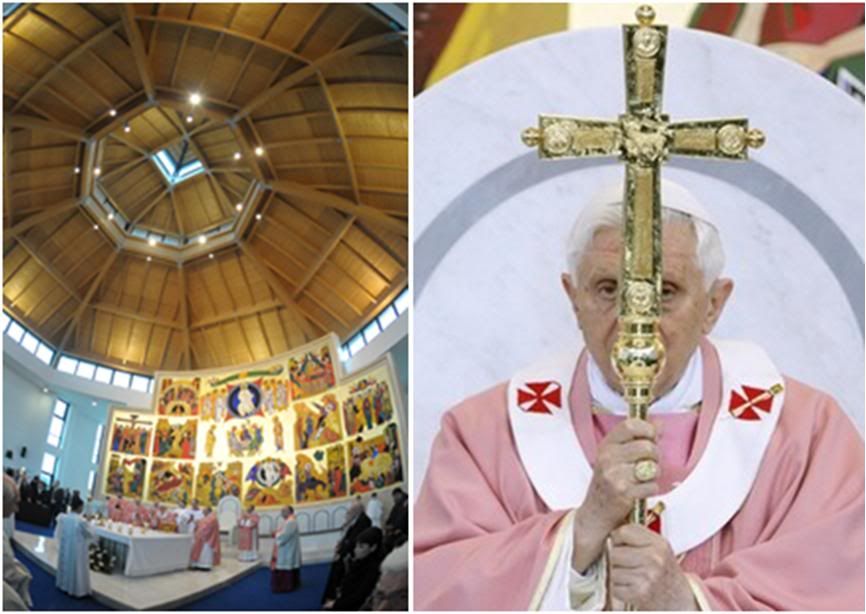
The media, distracted by appwearances that are often futile, have not paid much attention to the visit of Benedict XVI to one of the parishes in his Diocese - a tiny community, at the extreme eastern edge of Rome, on a cold December morning. These December pastoral vists have become a tradition that has not been abandoned by the Bishops of Rome.
And for them, the Pope celebrated Mass and then spoke to them - an important homily delivered extemporaneously.commenting on the question that John the Baptist, from his prison cell, asked his disciples to pose to Jesus:
"Are you he who is to come? Or should we await another?" is the question in the Gospel for the third Sunday of Advent, Gaudete Sunday, whose liturgical color pink expresses the joy of waiting for the birth of the Lord.
Speaking like ancient preachers and capturing the attention of those present, Benedict XVI discarded his prepared text to make it more actual - looking back at the history of recent centuries, recalling the many prophets, ideologs and dictators who answered that question, saying "Not Jesus, but we, can change the world." And they did change it, the Pope says, leaving behind a void and great destruction - and obviously "It is not they" whom the world awaits.
For this, we should ask Christ himself, from whom Benedict XVI imagines his reply, "Look at what I've done. I did not cause a bloody revolution, I have not changed the world by force, but I have lit so many lights that form a great way of lights through the millennia".
Lights which have been lit in the shadows and travails of every day, for men and women like Naximilian Kolbe, Damian de Veuster and Mother Teresa of Calcutta: "because it is not violent revolution in the world nor great promises that change the world - but the silent light of truth", coming from that God near us, who gives us the certainty that we will not be forgotten, as though man were simply a product of chance.
To this God, the Pope said, in words that everyone unerstood, we must come close. To become "one of the small lights' lit by him in history, and thus to bear, in the diligent vigil of waiting, Light to the world. The Light who came to enlighten every man.
As Peter Seewald said of the Pope himself after their last interview, "He has seen the Light of the world, and he reflects it to every man".
Since yesterday, I have a sudden work 'emergency' that will keep me away from the Forum till later today.
|
| |
 14/12/2010 14:07 14/12/2010 14:07 |
|
| | | OFFLINE | | Post: 21.683
Post: 4.318 | Registrato il: 28/08/2005
Registrato il: 20/01/2009 | Administratore | Utente Master | |
|
 Pope meets with Japanese bishops
Pope meets with Japanese bishops
to discuss problems with Neocatechumenals
By Carol Glatz

VATICAN CITY, Dec. 14 (CNS) -- Japanese bishops, including the president of the bishops' conference, met with Pope Benedict XVI and top Vatican officials on Monday afternoon to discuss the Neocatechumenal Way.
The Dec. 13 meeting with four Japanese bishops had been called by Pope Benedict, said the president of the Catholic Bishops' Conference of Japan, Archbishop Leo Jun Ikenaga of Osaka.
He told Catholic News Service that the meeting lasted nearly two hours and included the Vatican secretary of state, Cardinal Tarcisio Bertone, and "several other cardinals."
While the archbishop would not comment on the substance of the meeting, he said the bishops would have to have further discussions with the Vatican and the Neocatechumenal Way's co-founder, Kiko Arguello.
The Japanese bishops "have to make a plan to proceed," he said, adding, "We have to proceed slowly."
The meeting came more than a year after the Neocatechumenal Way's Redemptoris Mater seminary in Takamatsu was closed.
Bishop Francis Osamu Mizobe of Takamatsu and the diocesan pastoral council wanted to shut down the seminary because of concerns that the activity of the Way's members was damaging the unity of Japan's small Catholic community.
The Vatican conducted an investigation in 2007, and in 2008, Cardinal Bertone released a letter announcing the seminary would be closed and that many of the seminarians and faculty would be transferred to the Redemptoris Mater seminary in Rome.
According to an April 2009 news release on the Japanese bishops' website, the Neocatechumenal Way disagreed with the closure.
The bishops' concerns with the Way and the seminary were so strong that they traveled to Rome twice in early 2008 after their "ad limina" visit in December 2007.
They met with Vatican officials and the Pope to discuss what Tokyo Archbishop Peter Takeo Okada, then-president of the bishops' conference, said was "a serious problem."
"The powerful sect-like activity of Way members is divisive and confrontational. It has caused sharp, painful division and strife within the Church," the archbishop said Dec. 15, 2007, in an address to the Pope during the bishops' "ad limina" visit, made every five years to report on the status of the dioceses. The archbishop appealed to the Pope for assistance, saying his input "was direly needed."
I have not met any Neo-Catechumenal person, and I've only read about them the news reports over the past five years regarding their problems with certain dioceses like the ones in the Holy Land, in Japan and in Baltimore. Despite those problems, however, they passed the five-year experimental period given to them from 2005-2007 and finally got approval of their Statutes in 2008, which also included some liturgical concessions - such as saying the 'Sunday Mass' on Saturday evening, and their peculiar way of receiving communion (Everyone gets a piece of bread, then they all eat it at the same time, after which a priest goes around with a chalice of wine, from which each one drinks). Apparently, they also have their own 'catechesis' which awaits Vatican approval before they can print it for general distribution.
I am sure that in more than half a century of existence, this movement has done much good in many places around the world. But I have to be wary about any movement that needs to hear Sunday Mass on Saturday and devise its own Communion rite, and be alarmed when important host dioceses have ongoing years-long problems with their presence in the community, as if they were imposing themselves on the diocese, instead of 'co-existing' with the diocesan community as they are supposed to.
The 'disturbance' they cause to the community must be grievous enough for the bishops of Japan to seek papal intervention yet again after the not-unimportant closure of the NC's seminary in Japan the first time they presented their complaints against the NC!
Yet, we don't hear anything remotely similar about Comunione e Liberazione, or about Sant'Egidio, or the Focolari... What does it say about the NCs????
[Modificato da TERESA BENEDETTA 15/12/2010 23:15] |
| |
|
|
|
|